There’s hardly a time in a PPC campaign’s lifecycle that you wouldn’t need new PPC keyword ideas.
Whether you’re just starting or have been fishing in the PPC waters for years, there’s always room for additional keyword research.
Sometimes, your best-performing keywords might be ones you’d never have thought of if you hadn’t done some serious digging.
If you’re just starting, it’s pretty simple: you need some seed keywords to lay out your campaigns' foundations.
And even if you’re getting a 1000% ROI out of your seasoned PPC campaigns (oh, the promised land...), there are still a couple of good reasons to do additional PPC keyword research:
- As you add negative keywords over time, your volume will spread thinner, leaving you with a budget surplus and fewer conversions.
- There might be some PPC life-changing opportunities waiting to be discovered, like revealing your competitors’ sweetest keywords and stealing away their conversions.
The logic is simple:
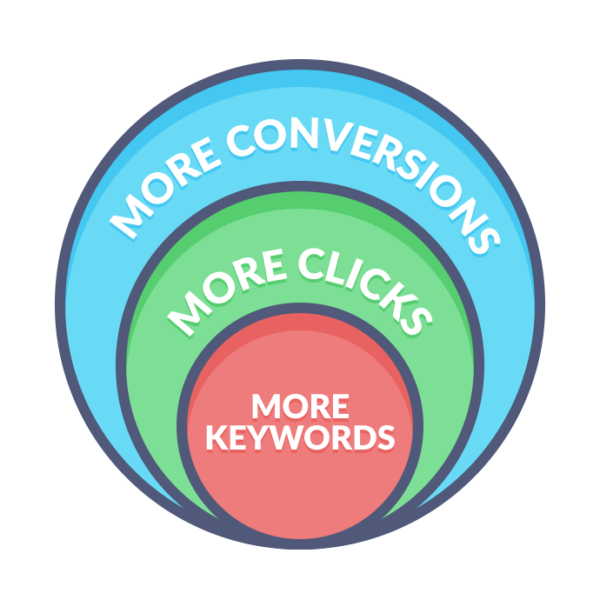
Okay, we’ll level with you—it won’t always be this clear-cut. Not all search intents match your offer or product/service, and more keywords alone won’t necessarily result in more conversions.
Finding more PPC keywords that attract the right audiences will lead to more high-value metrics like conversions—and that’s one of the biggest factors of your PPC success.
That’s why you need to look for new keywords constantly. And that’s exactly what this article’s set to accomplish.
This article will help you conduct better PPC keyword research and build bigger lists of keywords that’ll set you up for greater success.
Below, the first eight tactics are a must-have, but you should still go through all 22 to maximize new opportunities.
- 1. Reveal hidden gems with Google Ads search terms
- 2. Build your own broad match keyword mines
- 3. Up your game with Dynamic Search Ads
- 4. Set the base by using your brain
- 5. Get thousands of keyword ideas with the Google Keyword Planner
- 6. Step into SEO research land
- 7. Spy on your competitors’ PPC keywords
- 8. Observe your competitors’ landing pages
- 9. Scan your competitors’ blog content
- 10. Don’t forget your own blog content & landing pages
- 11. Use BuzzSumo to uncover brilliant ideas
- 12. Check out Ahrefs
- 12. When in doubt, Google
- 13. Use I Search From
- 14. Get cool ideas with AnswerThePublic
- 15. Flip through product catalogs
- 16. Read forums and news
- 17. Find popular keywords on Reddit
- 18. Discover long-tail keywords with Quora
- 19. Get smart insights with Wikipedia
- 20. Spy on…your own salespeople
- 21. Play around with your existing keywords
- 22. Look for synonyms
- Take these keyword ideas and give them all a try
Get brand new PPC strategies straight to your inbox every week. 23,739 people already are!
1. Reveal hidden gems with Google Ads search terms
Quick note: If your Google Ads (formerly Google AdWords) spend so far is zero, move on to number 2.
We wanted to start with this particular method because Google Ads accounts are often an unseen fortune as far as keyword mining goes.
By checking your ads’ search terms report, you will discover new keyword opportunities and find additional negative keywords to clean out.
How to get started
Log in to your Google Ads account and select a campaign or ad group you want to look at.
Select the “Keywords” tab, and then select “Search terms” to view the search terms that have triggered ad impressions (for a specific date range).
Pro tip: Search terms lists can get extensive and draining to look through if your selected date range is too long. Try looking back two weeks if you have a lot of data, or a month at most.
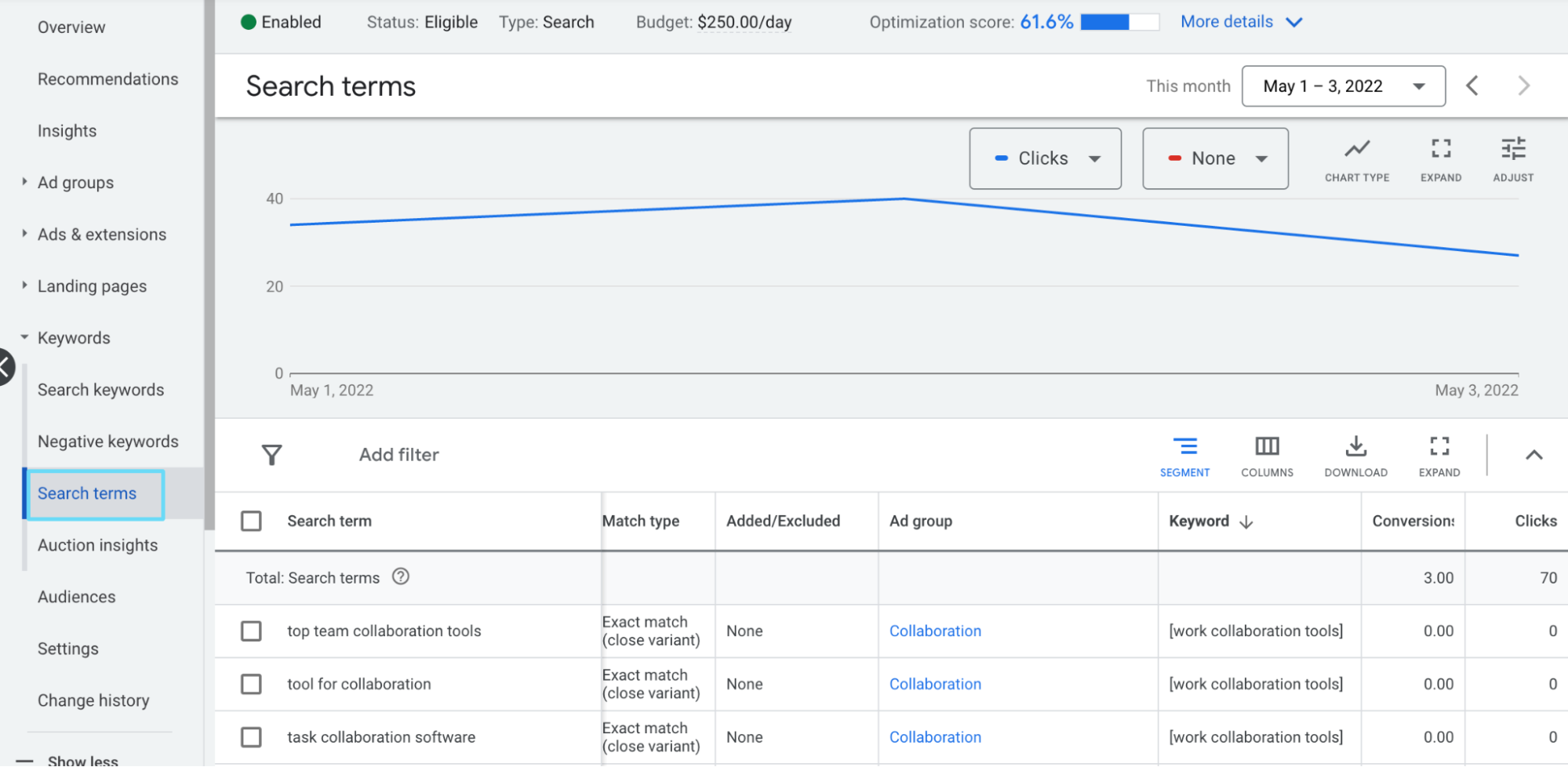
If your ads have run for a while, you should get a long list of different search terms googled by various people that triggered one of your keywords.
If you add the “Keyword” column to your report, you can also see what keyword those search terms triggered.
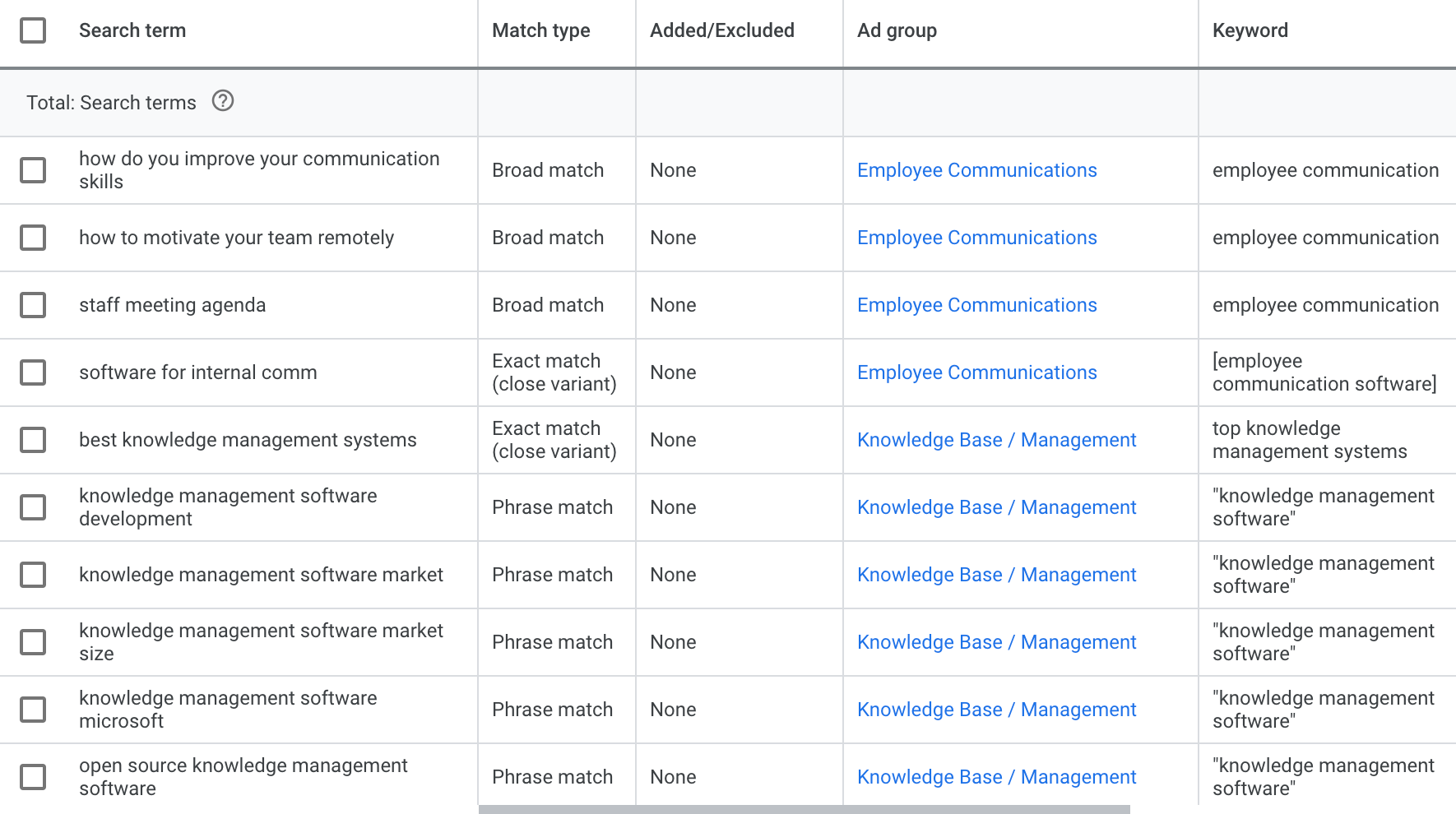
When you find a great-performing search term to add as a new keyword, you can either copy-paste it to a spreadsheet you’ve created for this research and add it to an ad group at a later time, or you can select the search term and click on “Add as keyword” to add to that ad group.
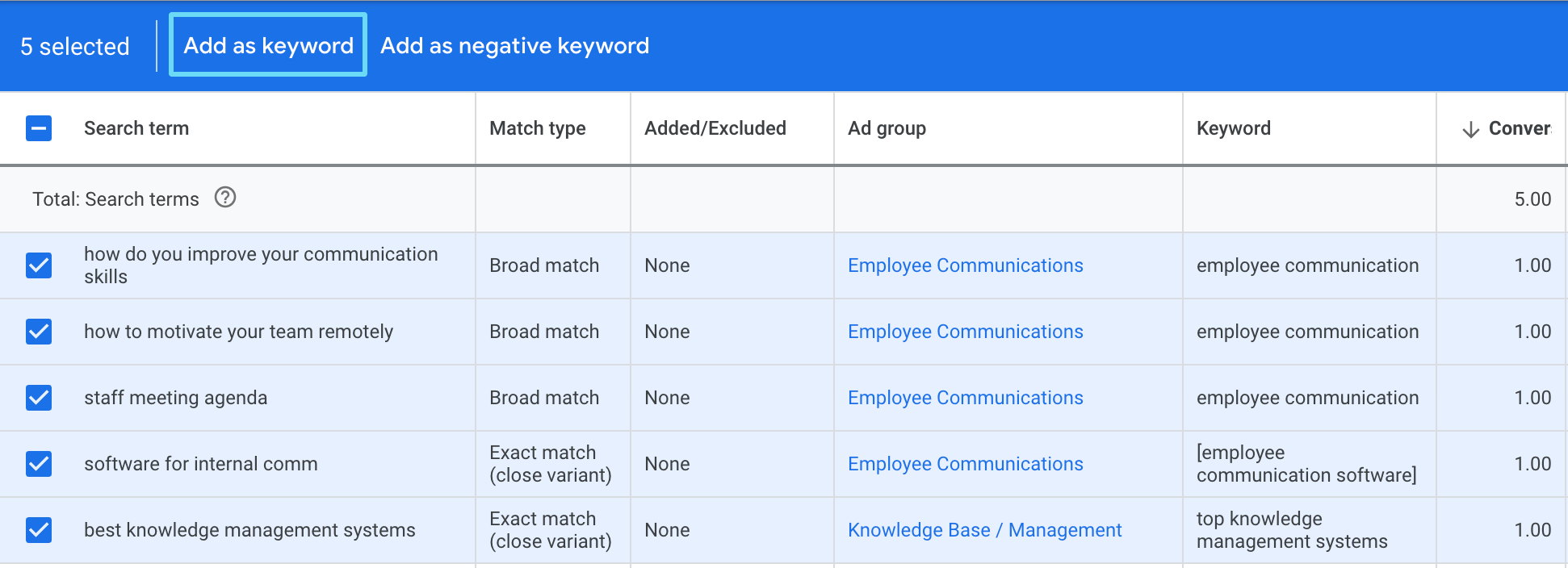
Note the difference: If you select “Add as keyword,” the keywords will be added to the same ad group you’re in now. However, it’s generally better to create new SKAGs (single keyword ad groups) out of those high-potential search terms.
Using SKAGs instead of ad groups overloaded with many different keywords gives you more control over your Google Ads account.
It helps you prevent the Iceberg Effect (when your search terms heavily outnumber the keywords targeted, resulting in lower relevancy).

2. Build your own broad match keyword mines
Even if you’re a die-hard fan of SKAGs, broad match keyword campaigns have their time and place.
Broad match campaigns can serve as valuable PPC keyword mines because Google Ads has more freedom to determine what searches your keywords will be triggered by.
On the flip side, you have to be careful with them because they can easily spend money on many irrelevant search terms. Trying to weed out all those irrelevancies to make them work can be a big time-waster in your optimization routine.
Set up a test campaign with a small budget and target a few broad match keywords. After your campaigns run for a while, you can dive into the search terms report and start mining for good keyword ideas.
Add these as new SKAGs or insert these to an existing ad group as you discover new keywords.
While all broad match search terms won’t really be the best place to spend your entire ad budget, they can lend a helping hand when you need new PPC keywords. You might find some terms you’d never expect would perform well.
How to determine optimal search terms to add as keywords
When assessing which search terms are good to add as keywords, look for search terms with the highest number of conversions and low CPA (cost per acquisition). Typically, it’s an indication that people’s search intent matches well with your value proposition.
But also use a heavy dose of common sense. Sometimes, even if a search term is getting conversions at great CPA, the actual term might not match the right intent for your product.
For example, say my product is an employee communication software. My keyword is “employee communication,” and the search term “how to improve my communication skills” is a top converter.
Do you think that someone searching that term shows valuable intent specifically toward an employee communications software?
Probably not.
Rely on both your numbers and your common sense when deciding to add new keywords.
3. Up your game with Dynamic Search Ads
Dynamic Search Ads aren’t as popular as other PPC campaign types.
That’s a shame because DSAs can be the perfect tactic for filling in the gaps in keyword-targeting campaigns.
Dynamic Search Ads use Google’s organic web-crawling technology to automatically target relevant search queries based on your website content or content on selected pages of your website. They can also target relevant queries based on pre-set categories.
How DSAs work
When Google finds new searches that match your Dynamic Ad targets (AKA pages on your site or categories you’ve chosen), it dynamically generates the ad headlines and landing page URL.
A word of warning: Dynamic Search Ads can be a wildcard. Sometimes, you never know exactly what Google will come up with, and it won’t always target the most relevant people or present the best ad.
But when looking for new PPC keyword ideas for your Google Ads and Microsoft Ads (formerly Bing Ads) campaigns, DSAs work similarly to the broad match keyword mining campaigns explained in the previous point.
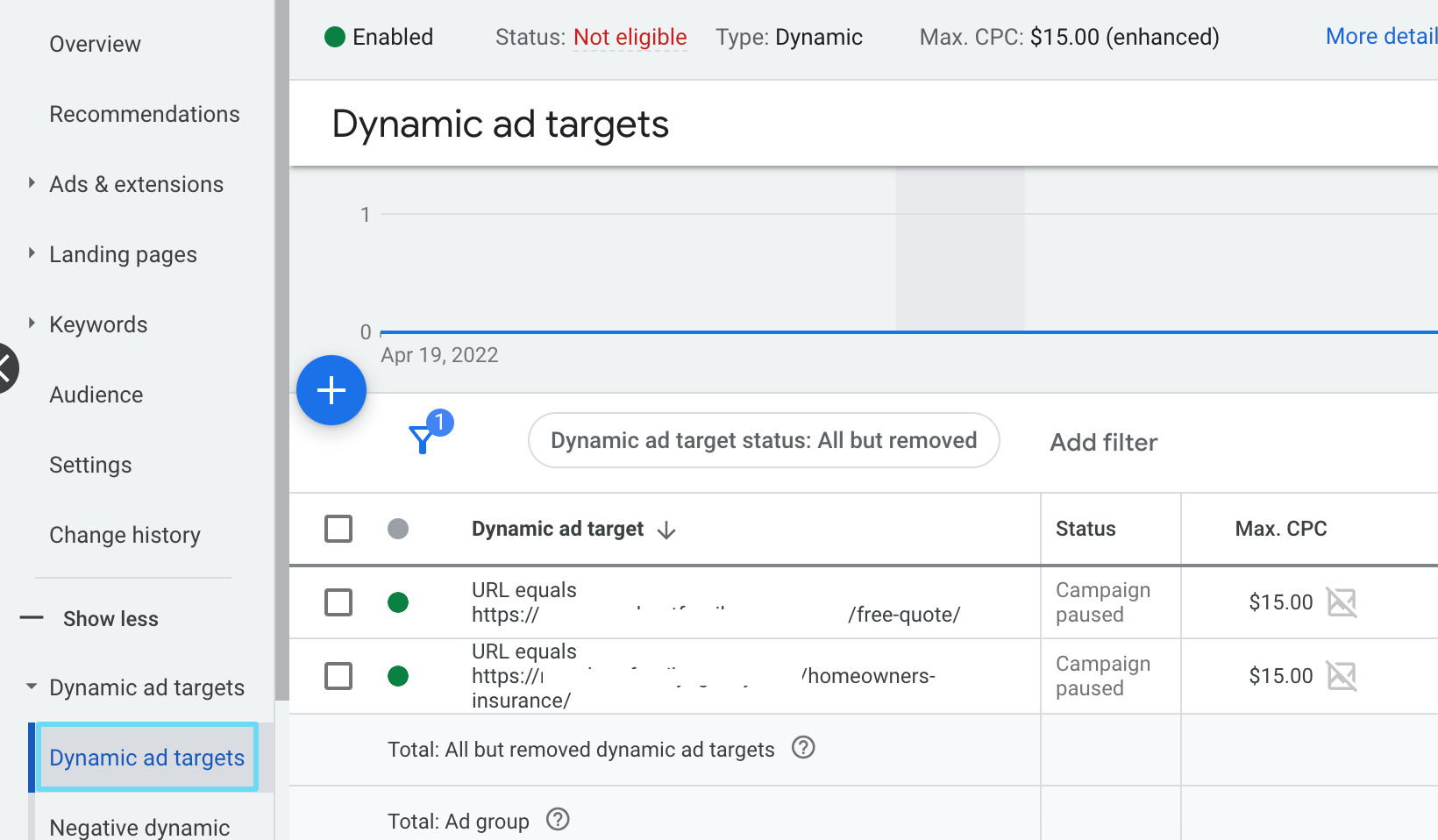
Hint: Dynamic Search Ads can have longer headlines than other search ads, which improves their visibility.
When your DSA campaign has collected enough data, try looking at the search terms reports to find your next superstar keywords.
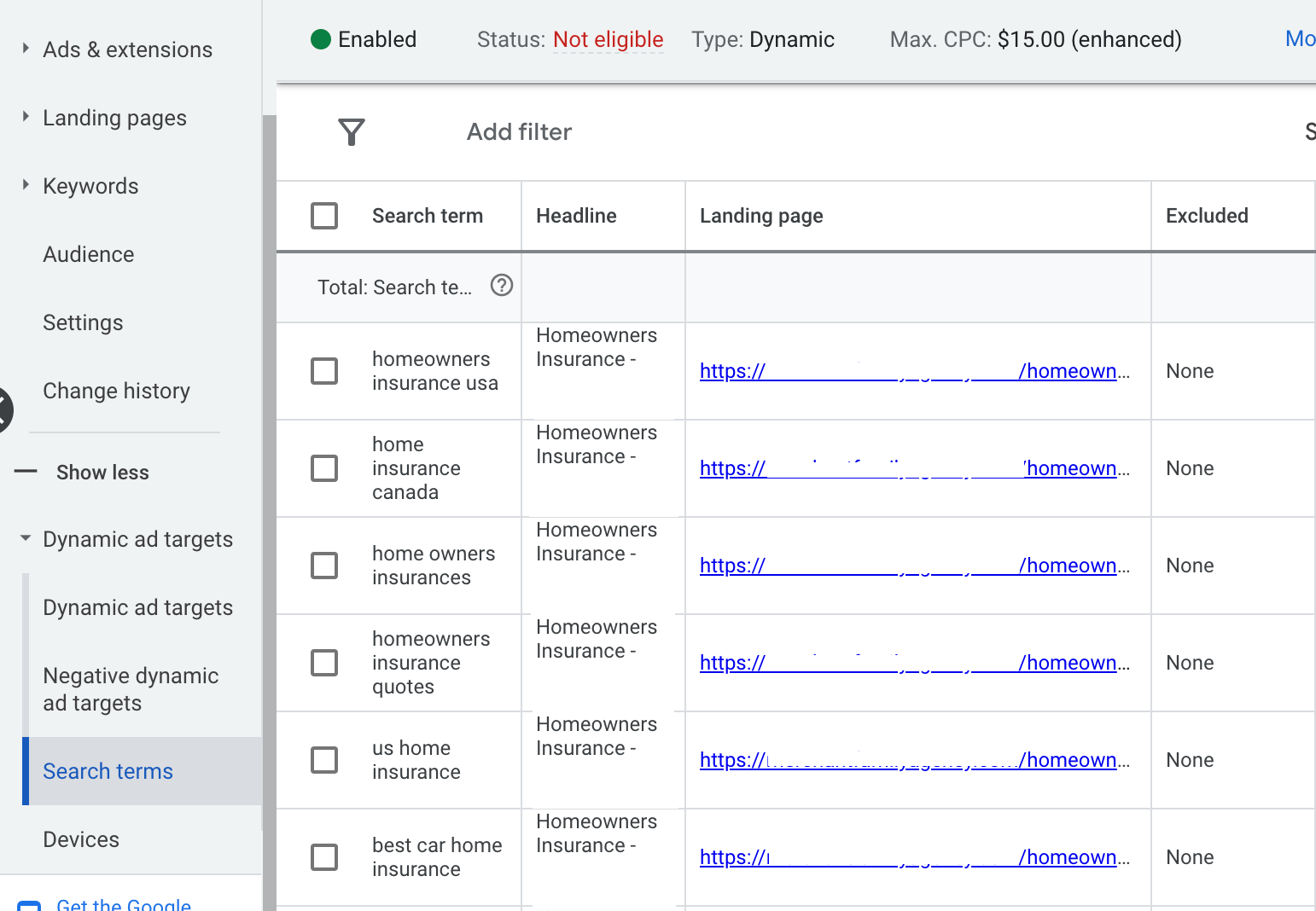
4. Set the base by using your brain
While keyword and PPC research tools are amazing in terms of features and usability, there’s an even more powerful force for discovering PPC keywords: you.
You’re familiar with your company’s unique value proposition (UVP) and know your industry’s jargon.
Before you jump to a keyword planner tool, write down some of the most obvious keywords that describe your product. You’ll need a starting point to use various SEO and SEM keyword tools.
Later on, you can explore each of these words in depth and turn one keyword into hundreds.
A brief brainstorming session will leave you with plenty of material for further investigation.
Also, write down the names of your top 10 competitors and their domains (you’re going to need this information in the next phase).
5. Get thousands of keyword ideas with the Google Keyword Planner
Google Keyword Planner is one of the best keyword research tools for PPC. And the best part is that it’s a free keyword research tool. (All you need is a Google Ads account, which you’ll have to create anyway for PPC advertising.)
Log into your Google Ads account. Click on “Tools and Settings” and under the “Planning” section, choose “Keyword Planner.”
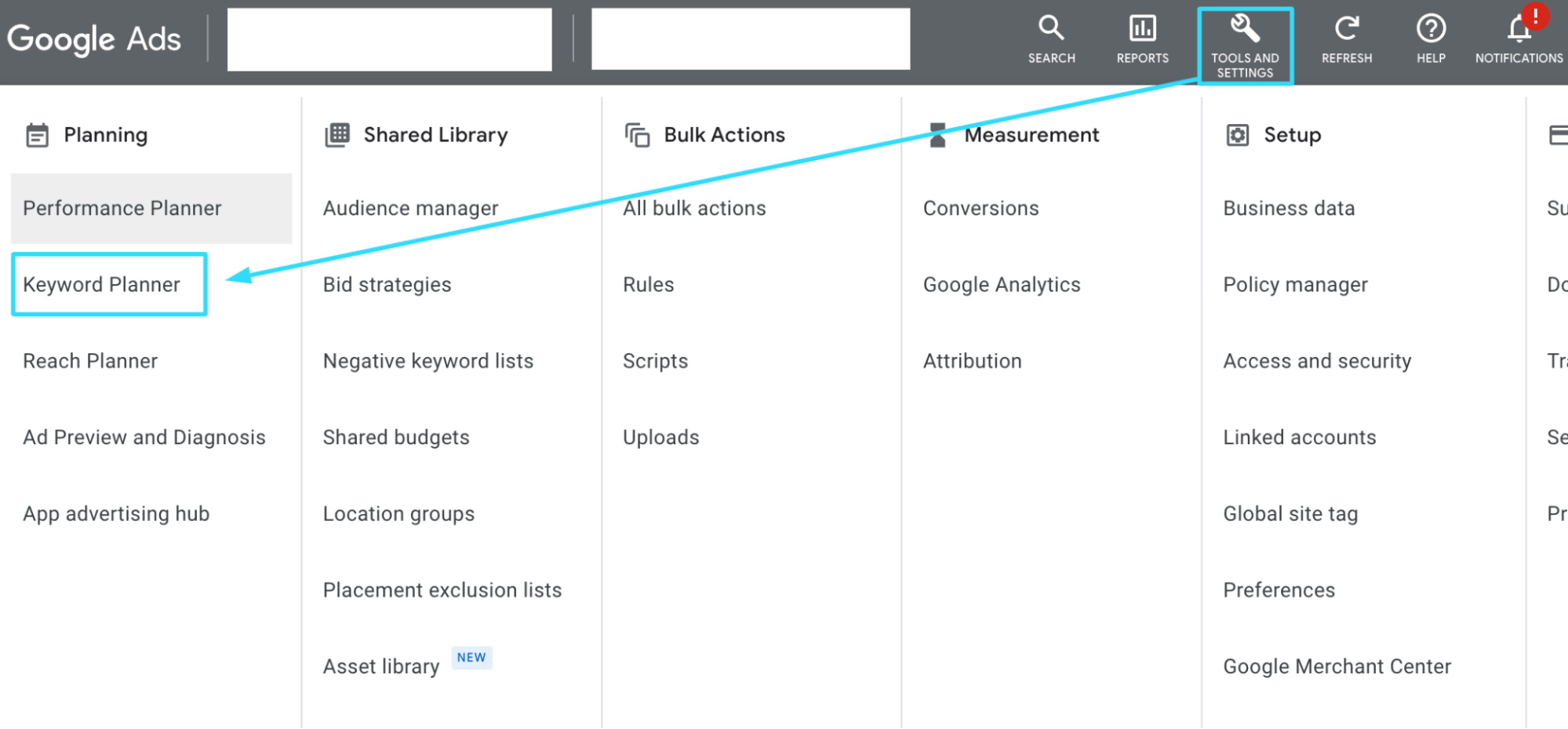
You’ll be presented with two different options:
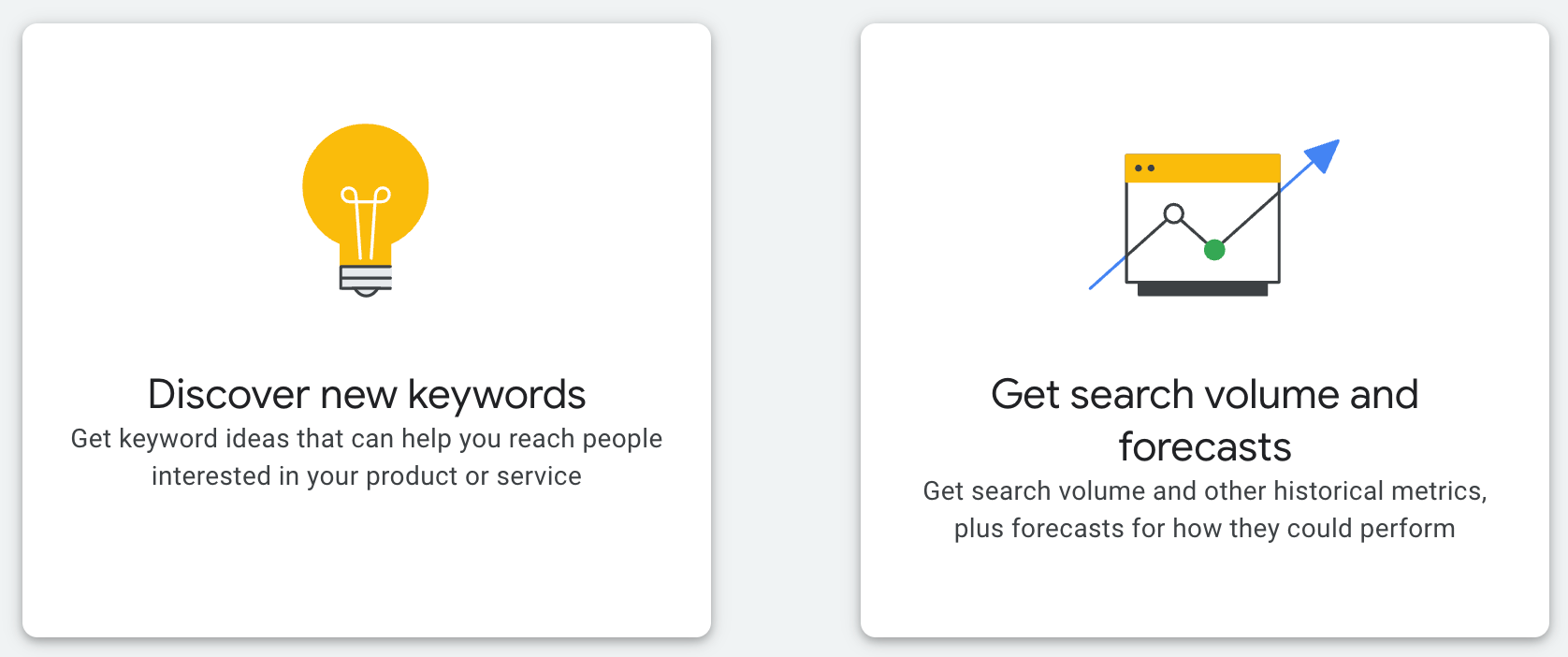
Start with the first option and search for new keywords by inserting a phrase or website. Typically (unless your SEO game on your website is excellent and easy for Google to crawl), it’s easiest and most accurate to start with keywords or keyword phrases to get ideas.
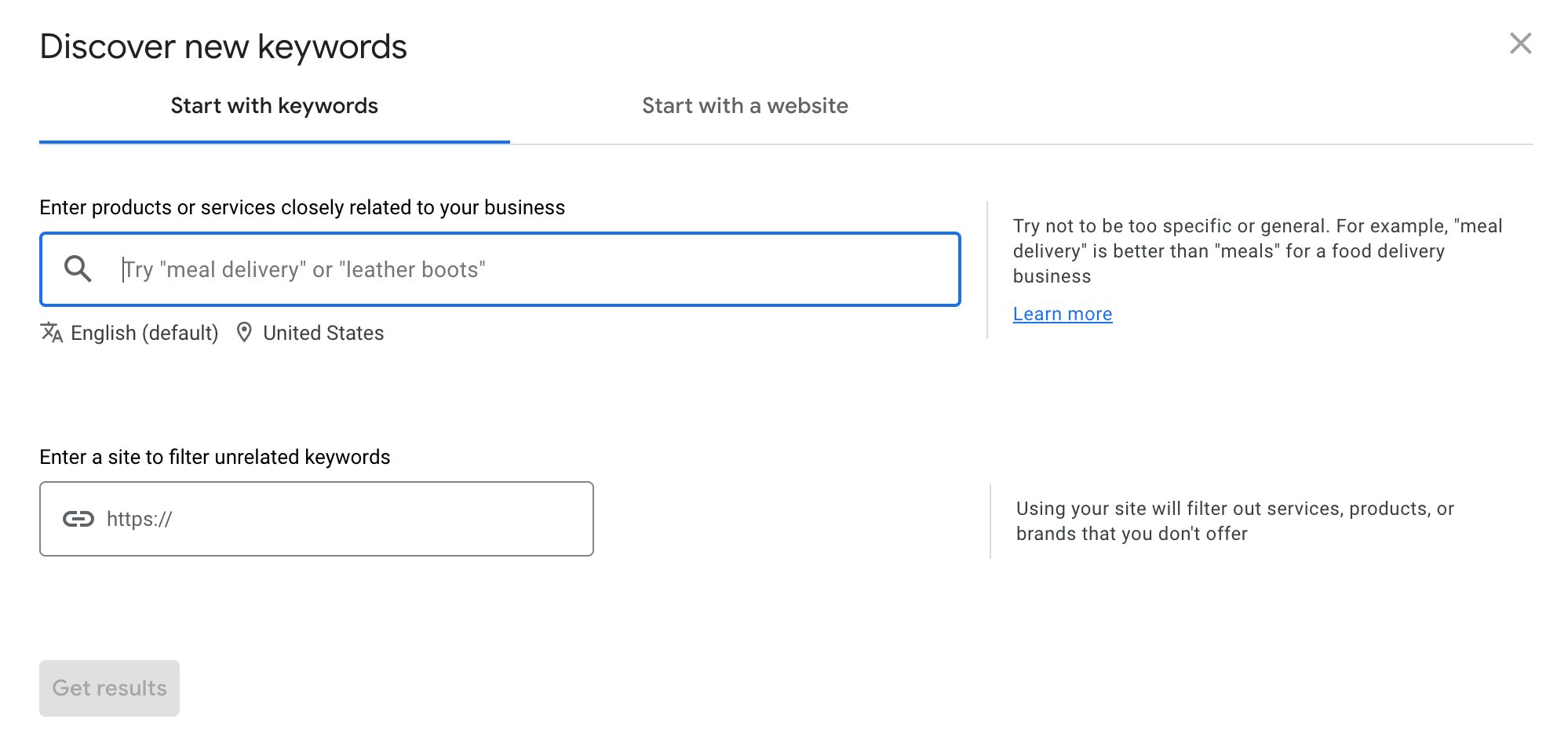
It’s super important that you enter relevant, specific information into the Keyword Planner to get the most out of it.
Once you’ve entered a keyword or website URL, click on “Get Results” and check out the Keywords Results Page.
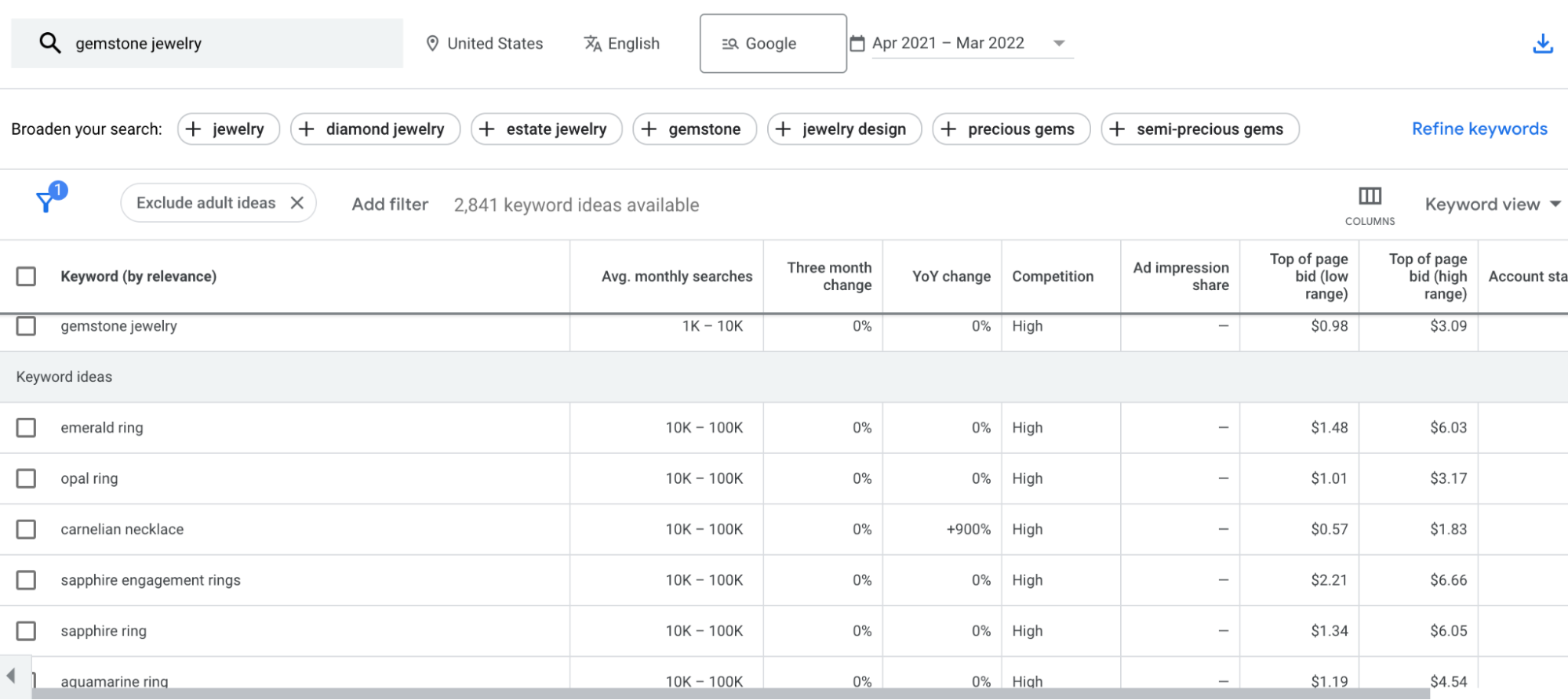
When looking at Google’s suggested PPC keywords, keep your eye on the average monthly search volume. There’s no point in creating a SKAG for a keyword with less than 10 monthly searchers.
And if your related keyword ideas are too vague, you can even refine your results by specific categories, such as branded or non-branded.
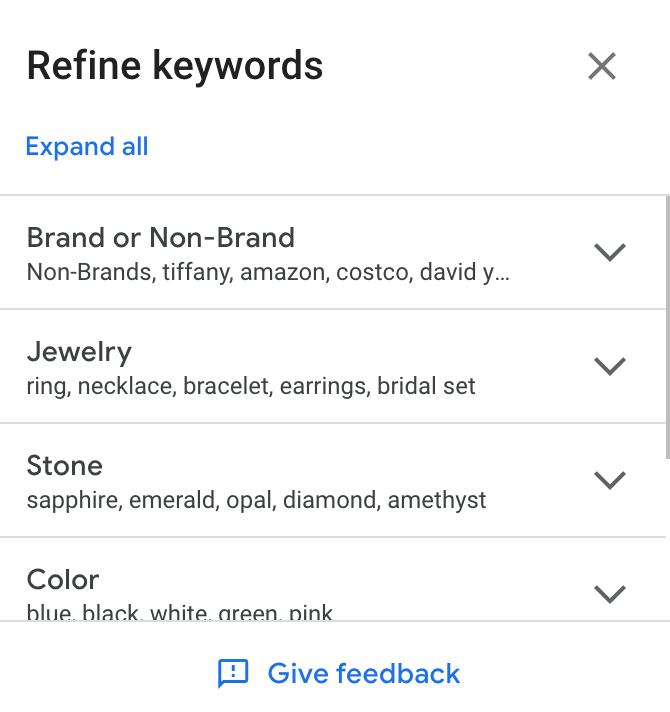
By now, you should have plenty of new keywords to add to your Google Ads account.
Most people would stop their keyword research here and head to Google Ads to set up new campaigns.
But you don’t want to be like most people. You want to be the top 1%, getting all the sweetest deals. So keep reading. 😉
6. Step into SEO research land
In many respects, the research needed for SEO is very similar to PPC keyword research.
You’re looking for golden keyword opportunities to drive more potential customers to your website in both cases.
These similarities also turn SEO tools into a rich treasure chest for PPC marketers.
There are tons of SEO keyword search tools that you can use, and maybe your digital marketing team’s already using some of these.
Many of these tools will give you similar insights as Keyword Planner does, but some of them do present some different information on the same terms that could give you better insights.
7. Spy on your competitors’ PPC keywords
Your keyword list is getting packed with ideas. So why not peek into what your competition’s up to?
PPC spy tools give you insight into what’s working for other companies in your industry.
Use the PPC spy tools as a gateway to finding brand new channels, offers, and other opportunities that you’ve never considered before.
You can uncover your competitors’ keywords with tools like SpyFu or Semrush.
SpyFu’s competitor Kombat Venn diagram is one of my favorites. You can enter multiple competitor domains (along with your own domain) to see which keywords you’re missing.
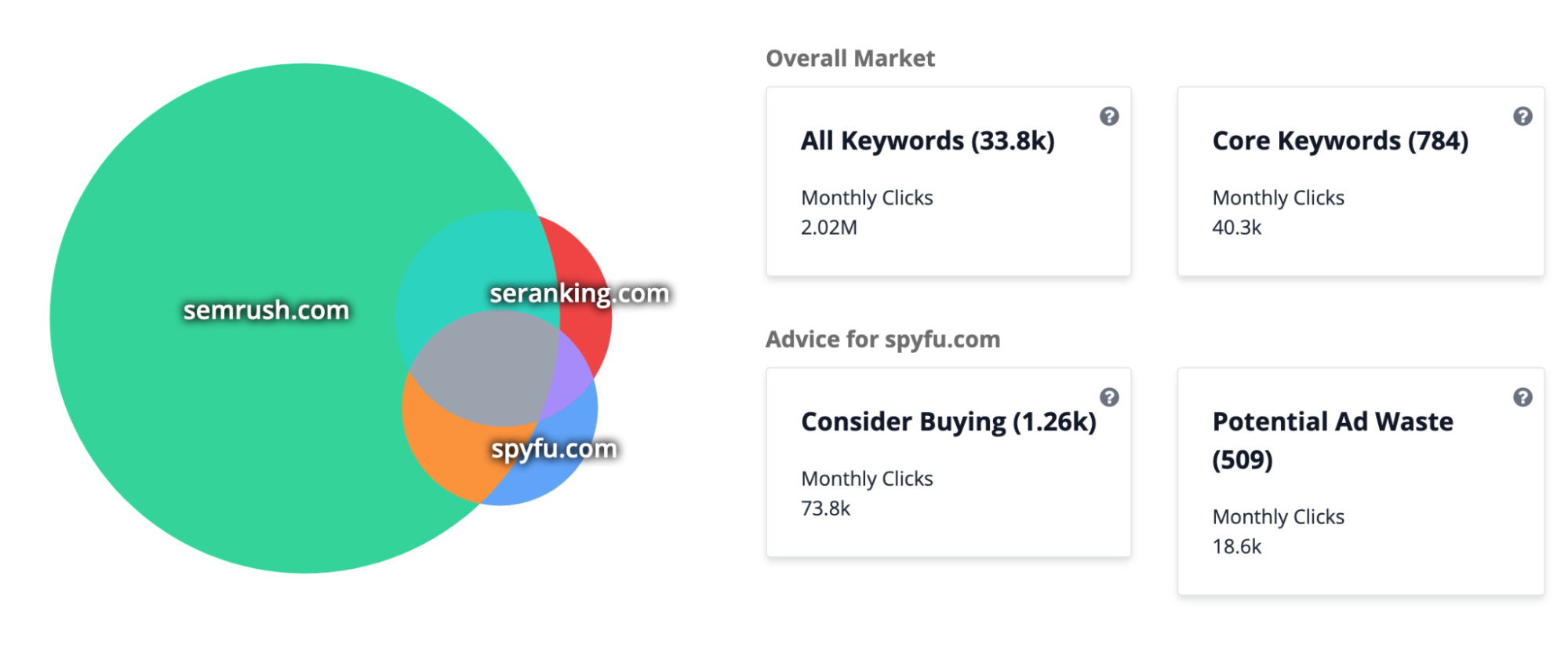
If you happen to know which competitors have legendary PPC agencies or enviable in-house teams working for them, the sweeter your insights will be.
A final note: You should still take spy tool insights with a grain of salt because what works for competitors might not work for you. Your competition could have a single ad group cannibalizing all others, or maybe they have 10x bigger budgets than you, so just keep these things in mind.
8. Observe your competitors’ landing pages
Browsing competing brands’ websites and trying to uncover all their best landing pages takes hours. That’s not the smartest way to spend your time.
With a little help from iSpionage’s landing page spy feature tool and the like, you can get the work done in 10x less time.
Give iSpionage the PPC keywords and competitor domains you want to look up, and the tool will give you a selection of their past and current landing pages.
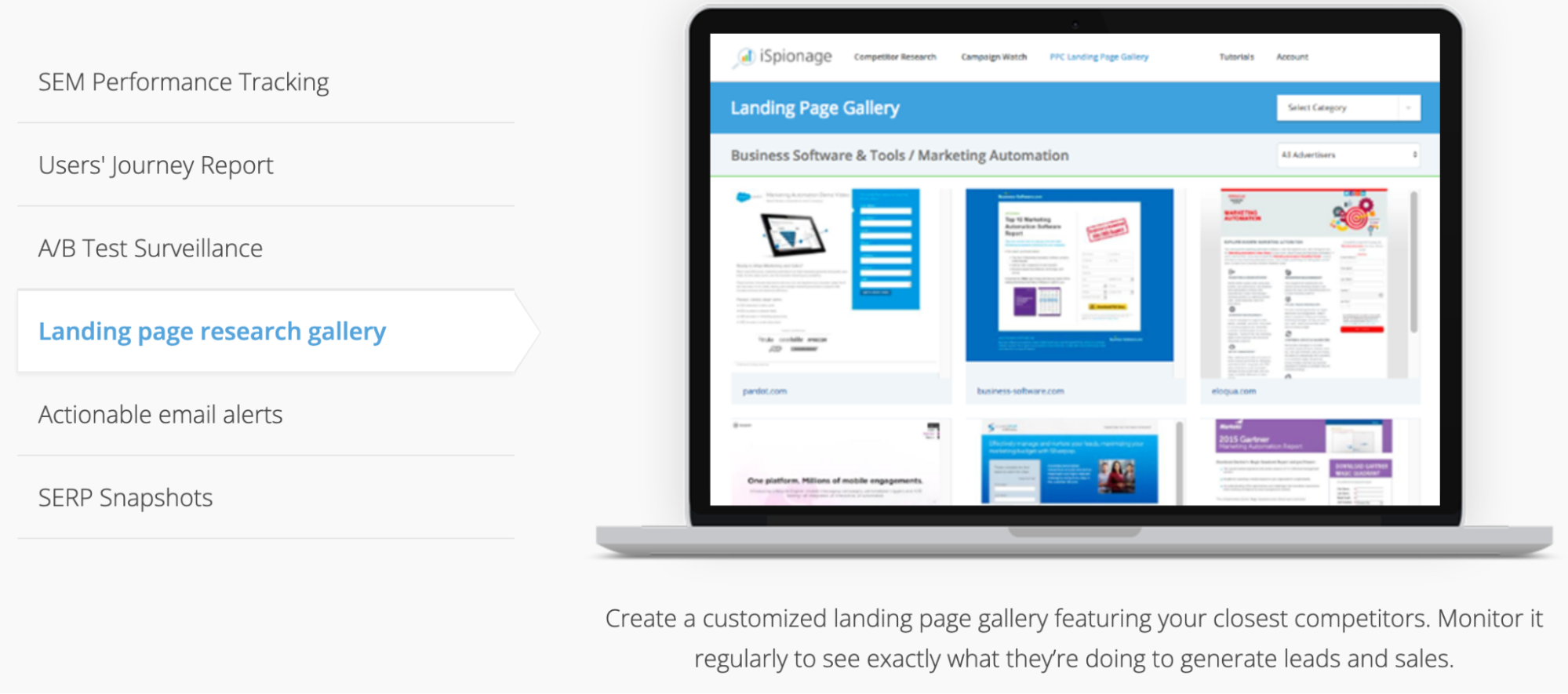
You can even discover all the A/B tests running on competing landing pages or set up an alert to be notified each time there’s a change on your competitors’ landing pages. Maybe they’re testing new keywords or website copy? You’ll be the first to know.
When using this tool for PPC keyword research, explore how competitors describe their products or services. And when they test out a new keyword on their landing page, consider if that might work for you, too.
9. Scan your competitors’ blog content
After completing those first eight points, you should have hundreds—if not thousands—of keyword ideas. These are the most obvious search terms to add to your Google Ads campaigns.
If you want to uncover exotic raw diamond keywords with competitor keyword research, take it to the next level. Check out their most-read blog topics, too.
You can either browse your competitors’ blog headlines or open the articles and use your computer’s find function to gather specific keyword ideas.
Take note of the words your competitors use to describe a specific product or service.
Keep a notepad close to write down all the ideas. You can later return to Google’s Keyword Planner to expand on these ideas.
10. Don’t forget your own blog content & landing pages
If you’re not into reading long blog articles, just ask your content and SEO teams for their keyword lists. These lists are often based on tons of customer research, and they’re a potential goldmine.
There are two ways to use content and SEO keywords for PPC:
- Use these as an inspiration to add new keyword ideas to existing campaigns.
- Create new low-threat PPC campaigns to drive people to your blog content instead of asking them to buy something right away.
11. Use BuzzSumo to uncover brilliant ideas
Your Google Ads or Microsoft Ads research doesn’t have to be limited to your brand and the competition. What about including the entire world?
With a tool like BuzzSumo, you can find the world’s most-shared content across all social media channels and various domains.
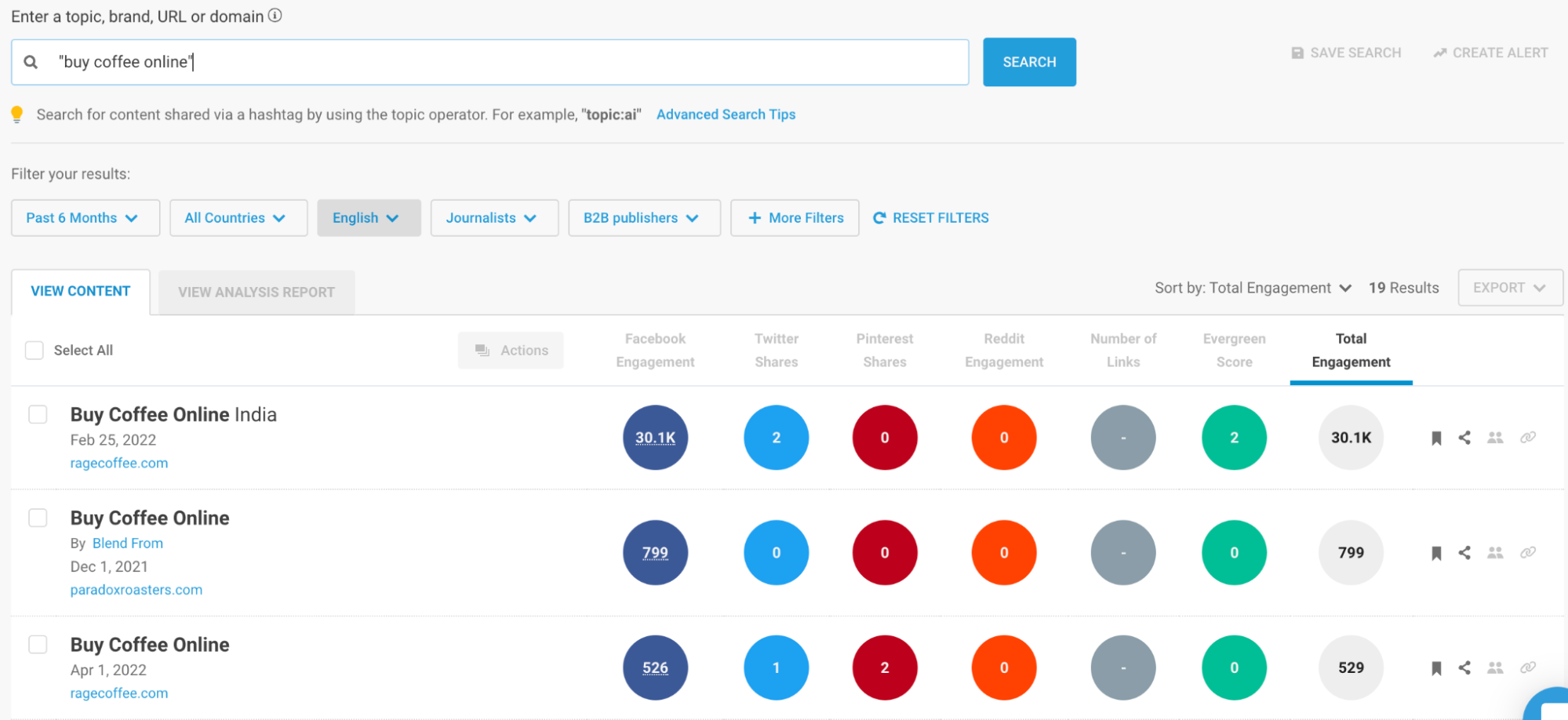
Be aware of the difference between commercial keywords and content-driven keywords. The latter is great for blog content but might have the wrong search intent for your PPC campaigns.
For example, if you’re an online coffee beans retailer, you’re interested in keywords like
- Guatemalan coffee beans
- online coffee beans sale
- best online coffee shops
Unless you’re planning to create low-threat PPC campaigns that lead people to helpful content, avoid keywords with a search intent that doesn’t match your PPC offer, like
- how to brew a good cup of coffee
- free coffee guide
- list of coffee types
You can also use BuzzSumo to uncover your competitors’ best-performing blog content. Just type in their domain to get the results.
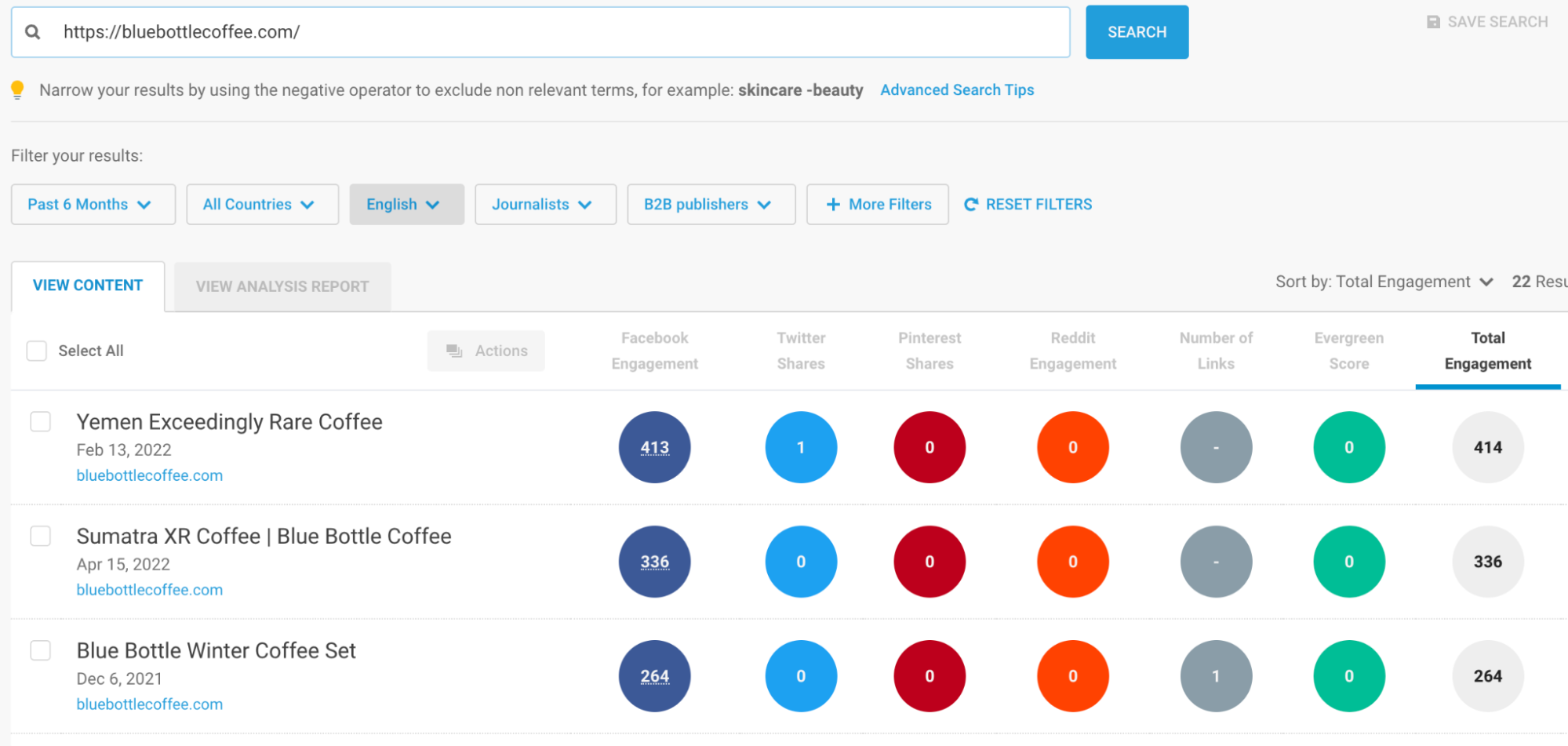
BuzzSumo’s a paid tool, but you can get some free limited searches each day. Play around with the content filters (date, type of content) and social channels to get additional insights.
12. Check out Ahrefs
Ahrefs is a paid SEO tool we rely on quite a lot at KlientBoost. It helps with everything from keyword research to exploring site traffic and content, and more.
It’s especially useful for learning about the keywords we’ll be using to reign in organic traffic. But keywords are keywords…meaning they can provide some insights toward paid search keyword ideas, too (AKA more juicy keyword ideas).
Plus, you can get a quick snapshot of the overall volume and traffic potential of any keyword you type in, which is a big plus.
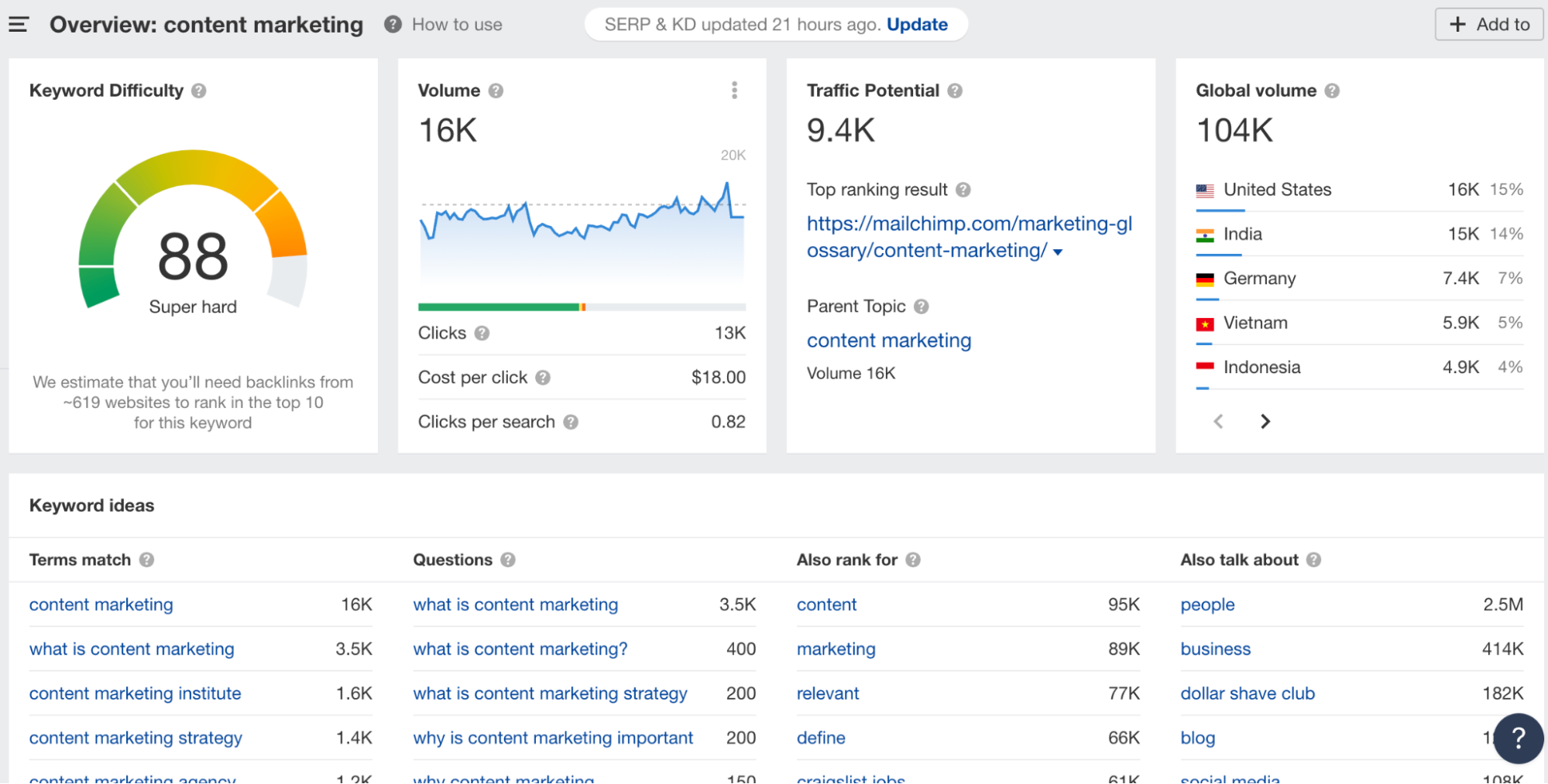
As far as paid tools go, if you’re only looking for PPC keyword research and not organic keyword research (or overall help with organic content and ranking), Ahrefs might not be the best fit for your pricing and use case.
But, hey, if you also need some organic search help, it’s a good platform to turn to.
Or, even better, if your content team already uses Ahrefs, hit them up for that login.
12. When in doubt, Google
Once in a while, you’ll run into a high search volume keyword that looks like an undiscovered treasure. Yet no competitors seem to bet on it in Google Ads.
There could be two reasons for this:
- The search intent of people searching for this keyword doesn’t match with your value offer.
- You’ve just found a pearl in the middle of the keyword ocean.
Let’s say you found out that the keyword “online coffee” has 2,000 monthly searches in the US. However, none of your US competitors seem to bet on this PPC keyword.
Like you’d do a background check on a seemingly perfect job candidate, you should also double-check high search volume keywords by simply googling them.
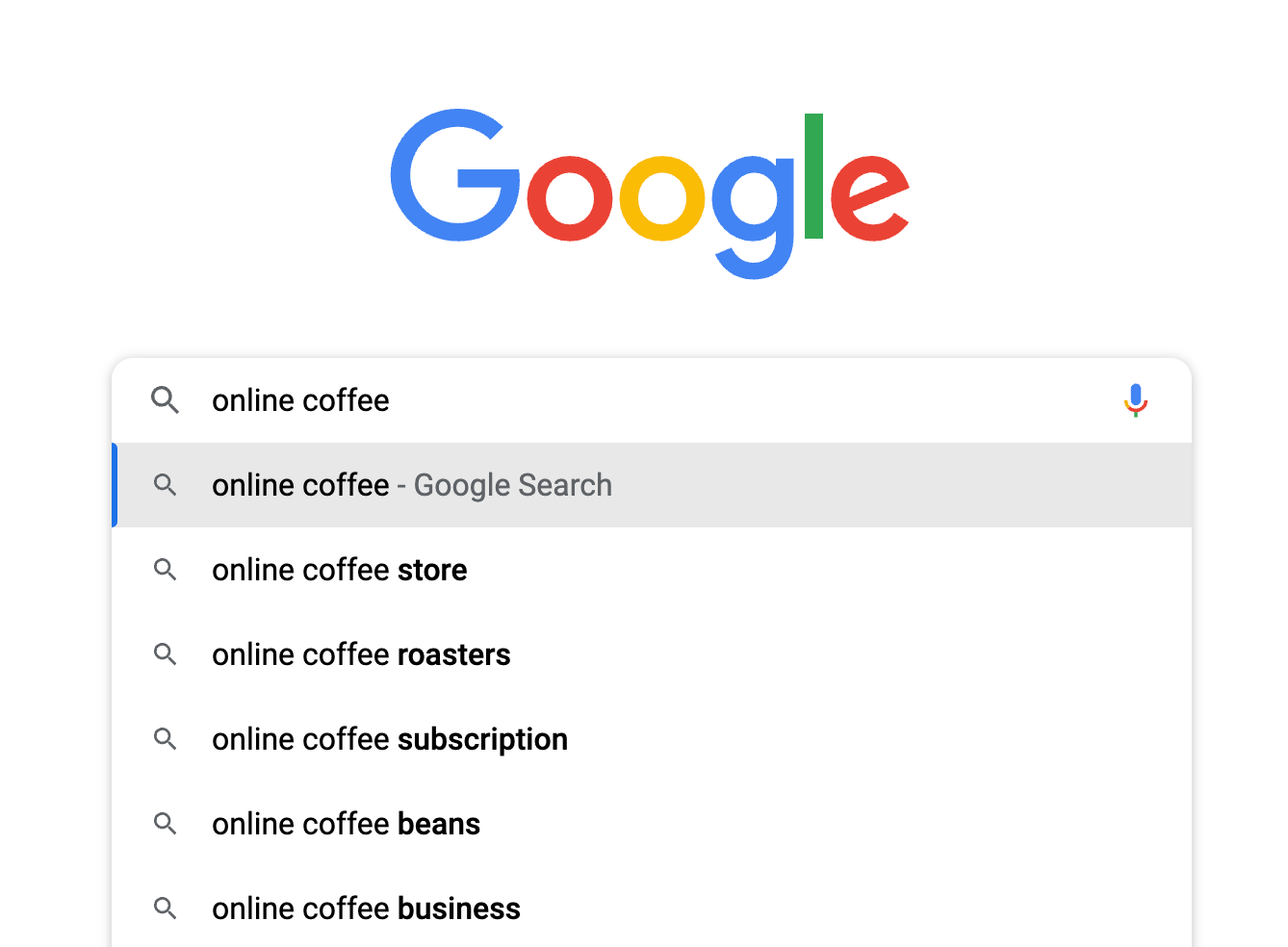
You may find that this keyword is mainly used by people looking for online coffee guides, not coffee stores. Or, you could have just uncovered a new keyword opportunity.
In addition to the search engine results page (SERP) answers, you’ll get more potential keyword ideas by looking at Google’s autocomplete suggestions.
If you use broad keywords, they’ll likely already be triggered by search terms like those. But as you add more words to the search, you’ll discover even more potential longer-tail keywords for SKAGs.
The reason you’ll want to find long-tail keywords is that they tend to have higher CTRs. The more relevant your ad is to the search term, the better results you’ll get.
Higher CTR = more clicks = more conversions. (Generally.)
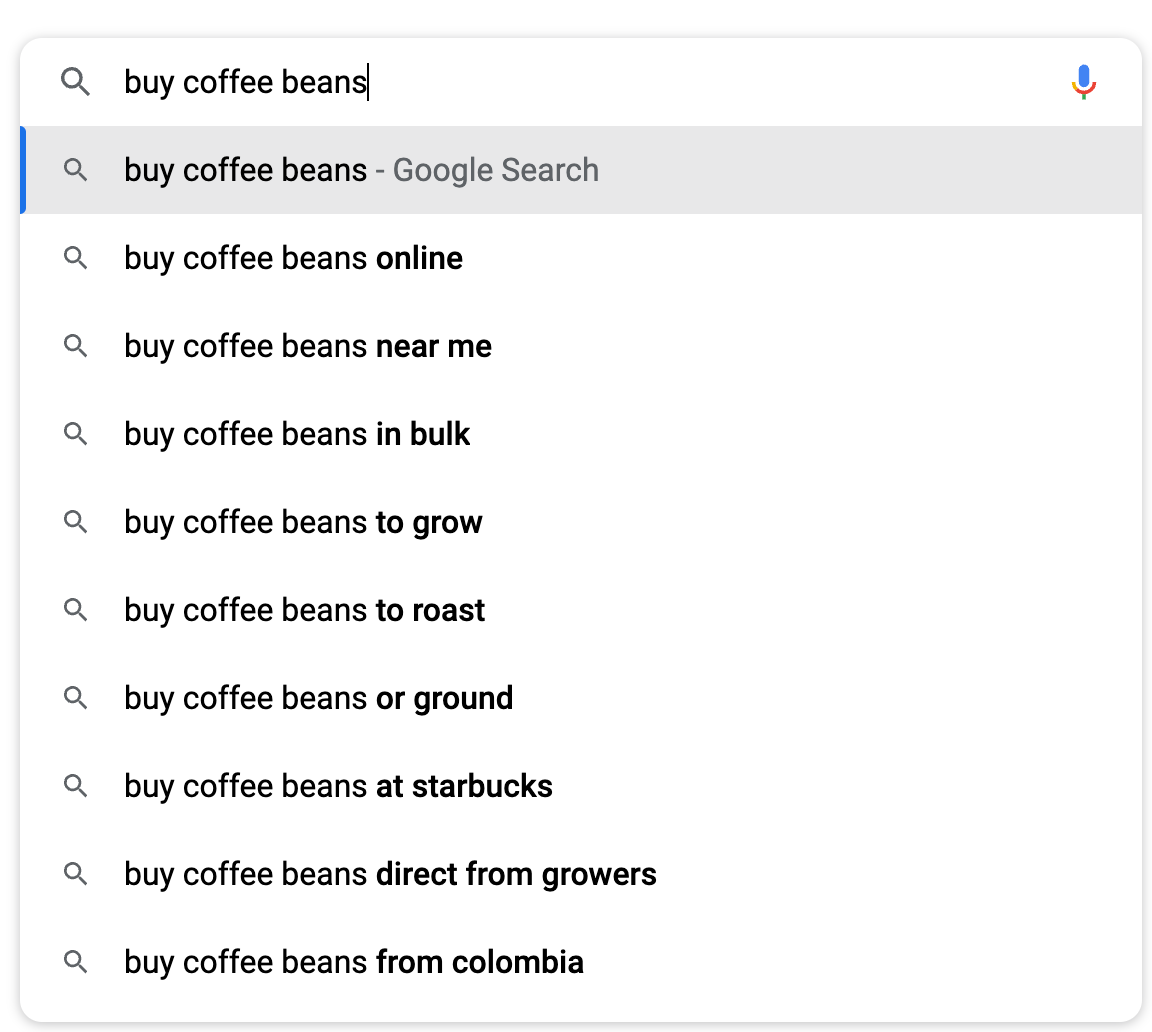
After picking all the best keywords from the top of the SERP page, scroll down, and you’ll find even more wildcard suggestions.
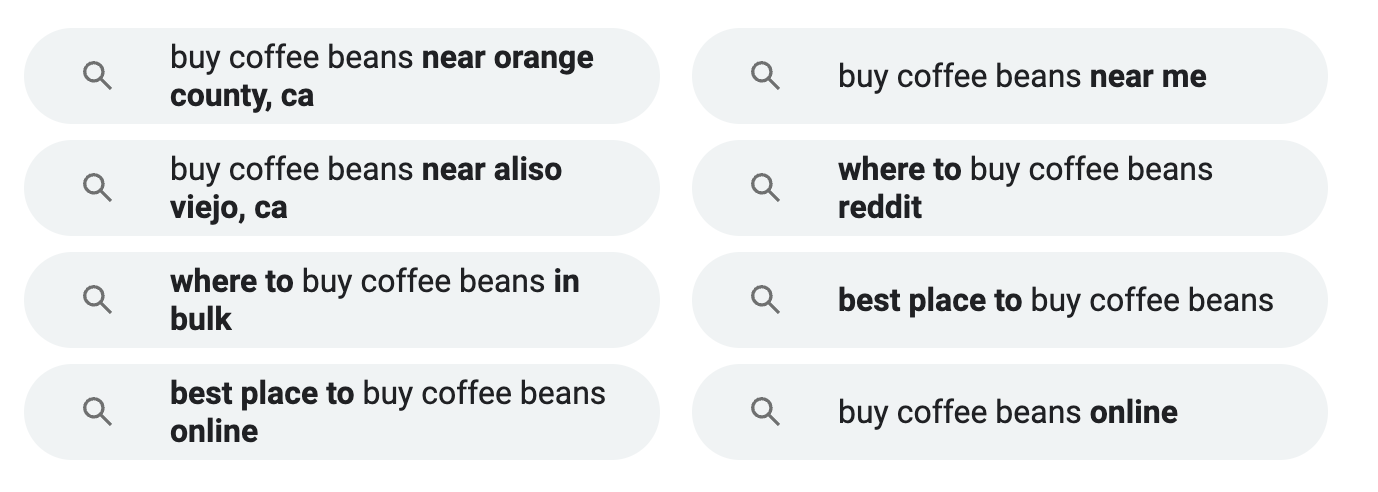
13. Use I Search From
Seeing your competitors’ ads in PPC spy tools is undeniably helpful when brainstorming new keyword ideas.
However, the person searching for a keyword on Google doesn’t see a single ad—they see up to four ads at the top of the page, followed by organically ranked content.
People don’t decide to click on a particular ad based solely on its text. First, they compare it to other ads, and only then will they select the most promising one.
To develop magnetic keyword ideas (and ad copy) that’ll drive buyers to your landing page, see how the SERP page looks to your target audience.
You’re not always located in the same country as your buyers, so using a marketing tool like I Search From can be helpful. Here, you can enter the location, language, and device of the potential person searching for your keyword.
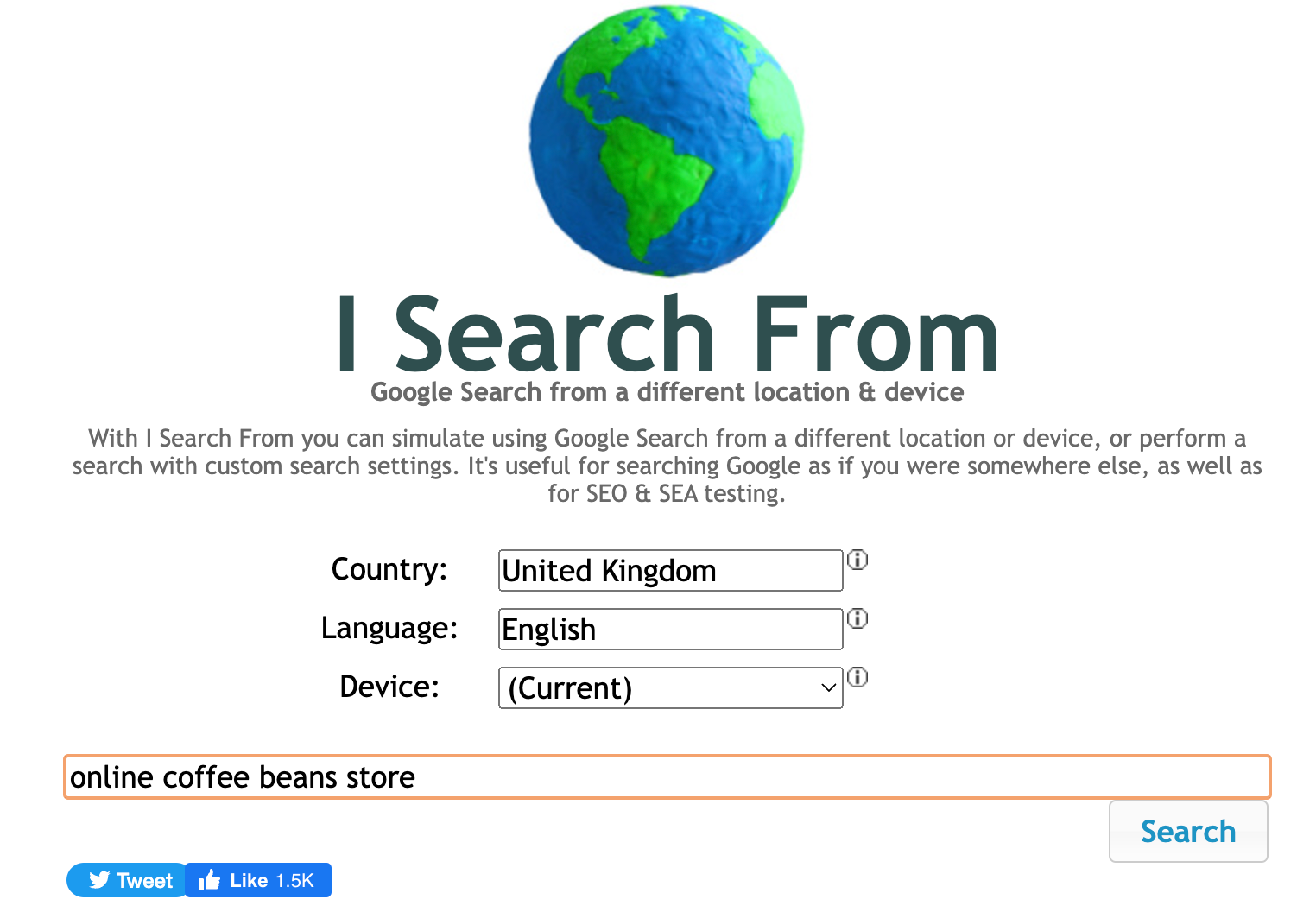
As you click “Search,” you’ll see a SERP page just like a potential buyer would see it.
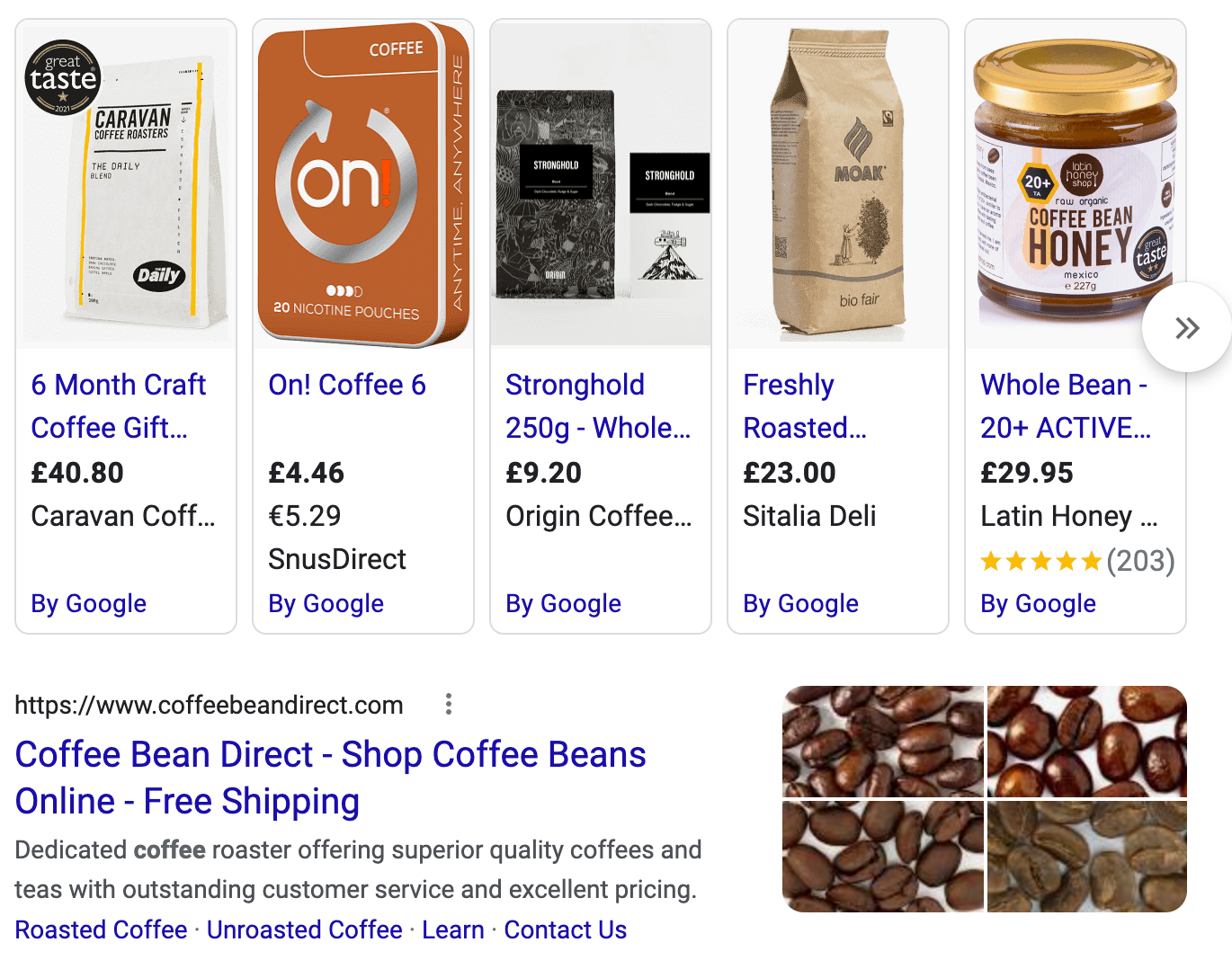
Here’s a quick summary of what you should be looking for:
- The products that are being sold. Maybe your potential keyword is typically used to describe a different product/service and is irrelevant to your UVP.
- The keywords used in the headlines. Are these exact matches to the search term?
- The value proposition competitors are using. Can you offer something better?
Basically, you want to ensure that when bidding on a new keyword, you’ll be able to draw people’s attention to your ads. You’ll also want to make sure that the search intent matches the value offer on your landing page.
14. Get cool ideas with AnswerThePublic
Out of all SEO and PPC keyword research tools, AnswerThePublic is an underdog.
This tool allows you to enter a search term and select a country. In exchange, you’ll get stunning data visualizations with hundreds of keyword variations.
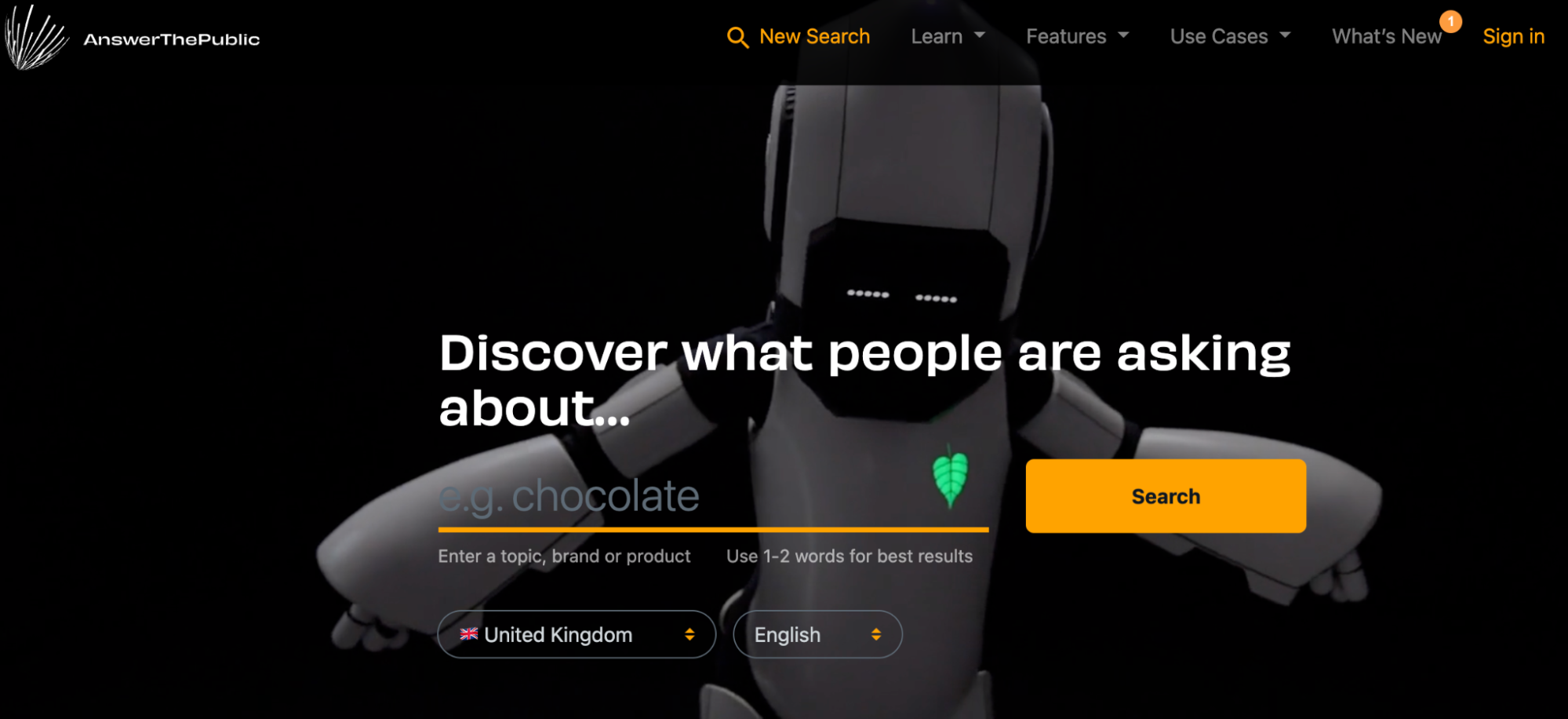
Some charts show you an incredible amount of questions related to your keyword:
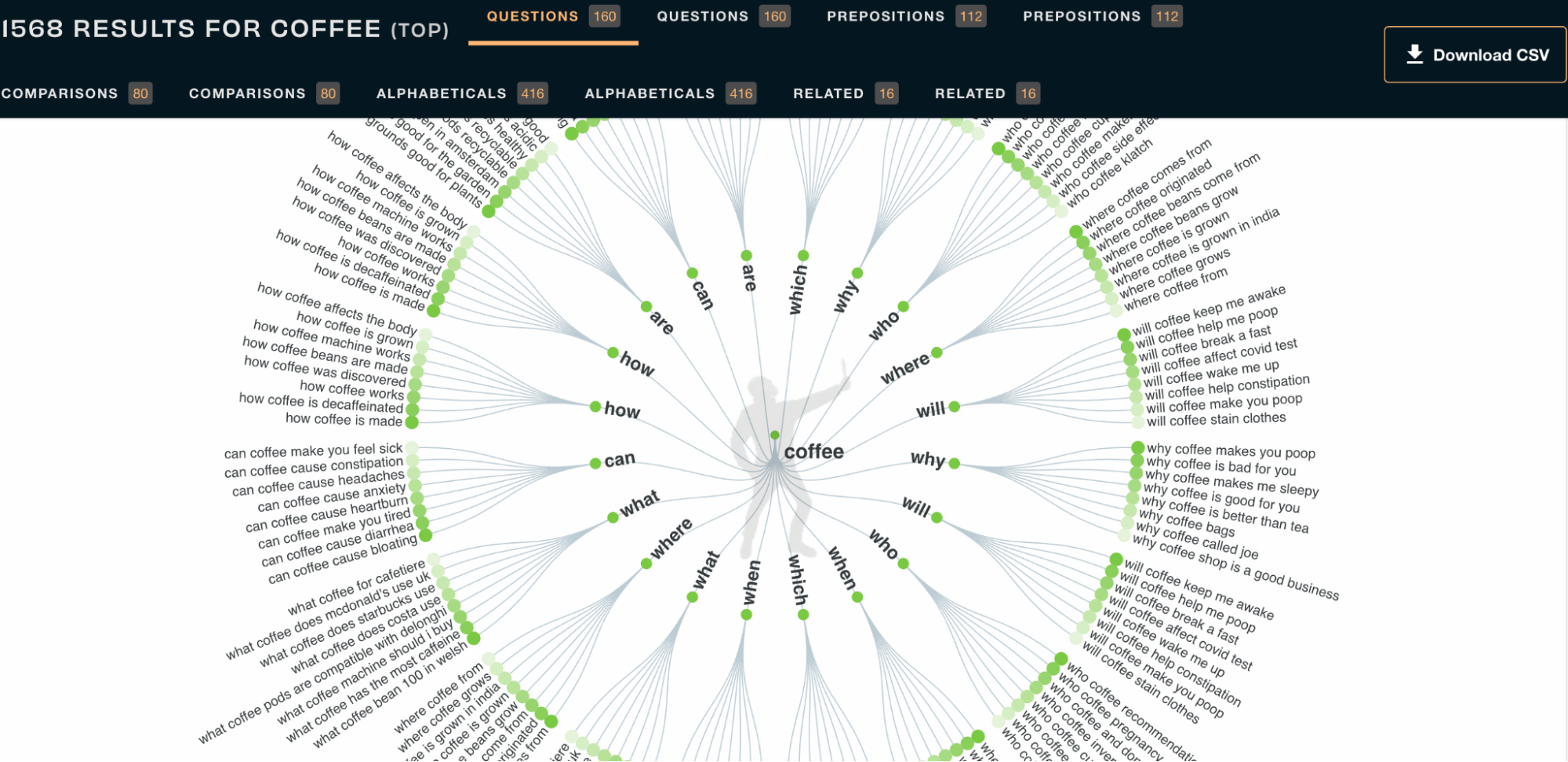
You can also see alphabetical lists of word pairs containing your keyword:
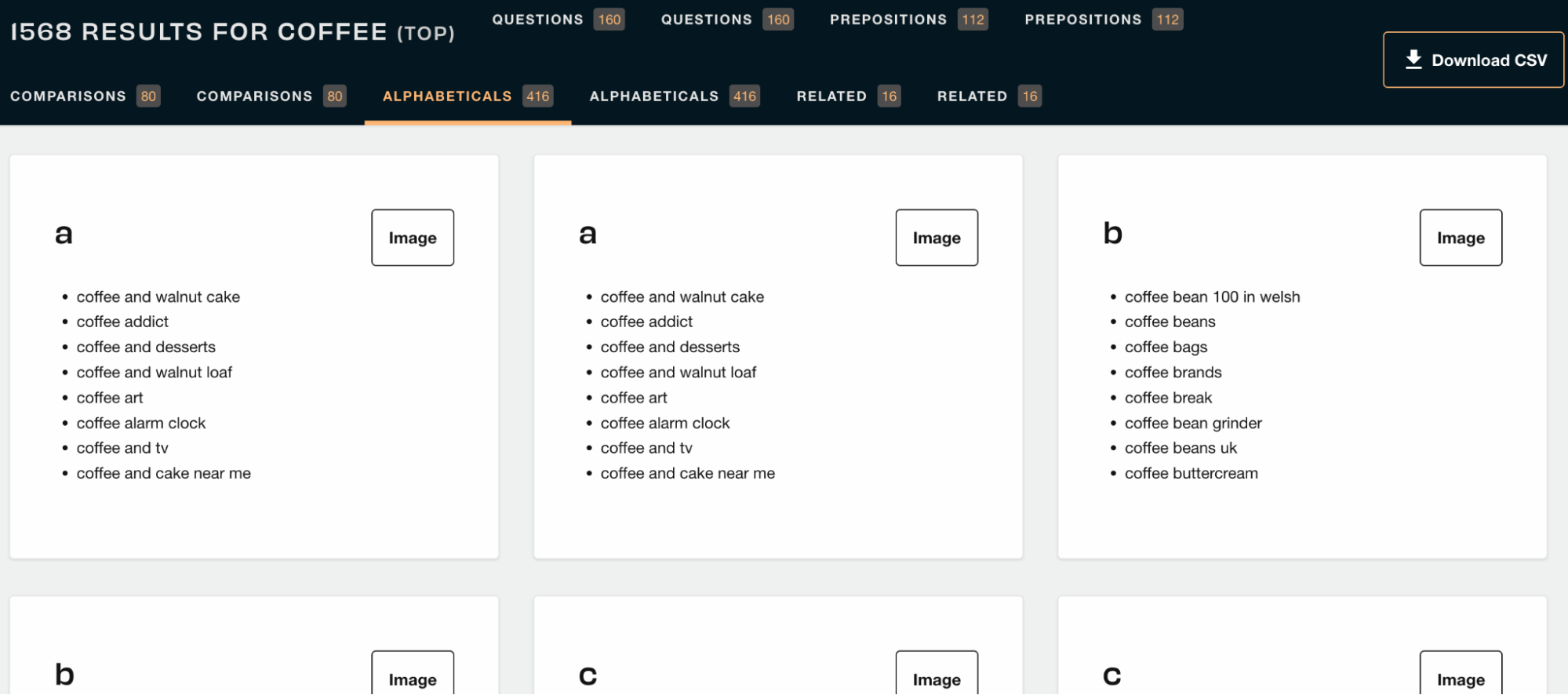
For our “coffee” search, there were a total of 1,568 results. How’s that for massive keyword expansion?
15. Flip through product catalogs
This one mainly applies to eCommerce sites selling a large variety of products.
When conducting thorough PPC keyword research, don’t forget to browse through your product catalogs (or the ones on competing websites).
For example, a company selling sports shoes could check out Nike’s official website to get additional ideas of product categories (running, basketball, training shoes, etc.).
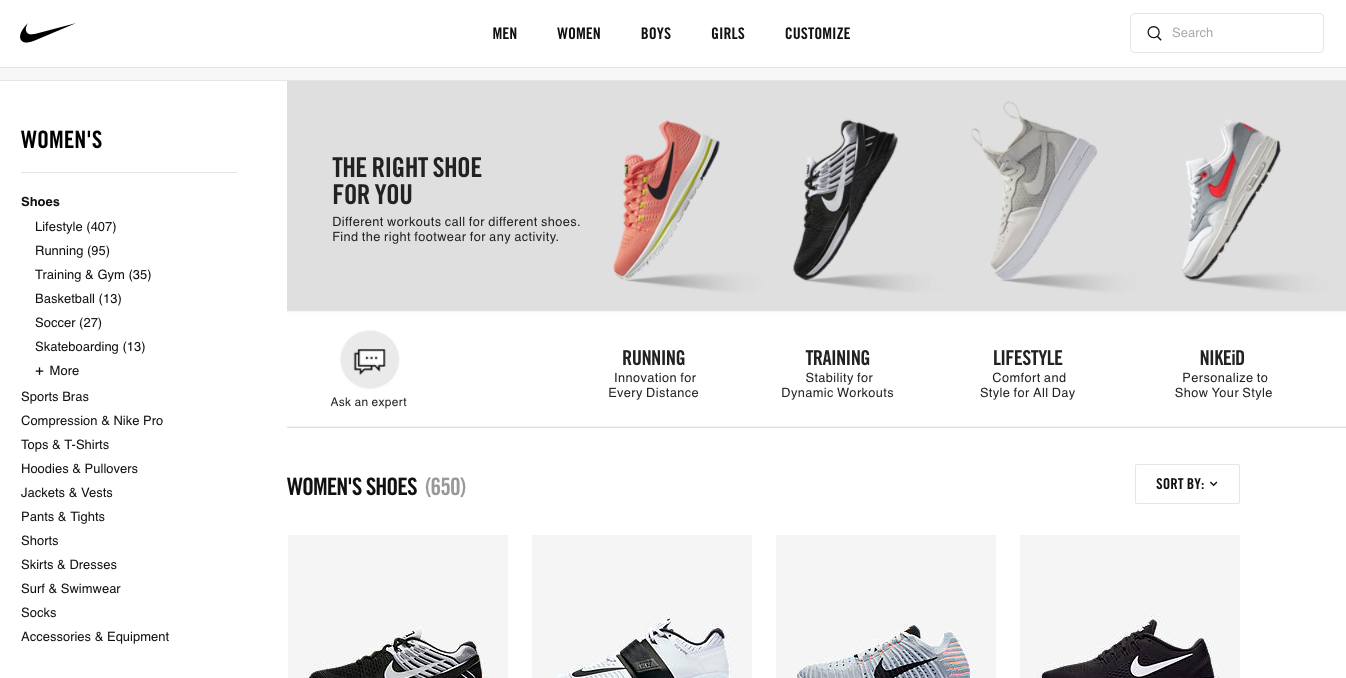
Even if you’re not selling a specific product, you can expand on those findings using a keyword research tool.
16. Read forums and news
Forums are like having live focus groups ready for questioning, 24/7.
The easiest way to find forums visited by your target groups is to simply ask them. Or, you could easily conduct a Google search: “keyword” + “forums.”

Once you find an interesting forum, you’ll notice that the forum is divided into sections that each signify a niche topic. That’s a potential keyword resource.
Dig deeper and read a few threads on each topic to learn which words your target audience uses to describe your products or services.
17. Find popular keywords on Reddit
You can use Reddit for similar purposes as forums—to find currently prevalent topics.
Although it’s not our first pick as a source for keyword ideas (mainly because of the bulk of irrelevant things mildly related to your search), it’s a good site to scope out if you’re really reaching.
Search for your keyword and navigate to a relevant subreddit to check out what people are talking about.
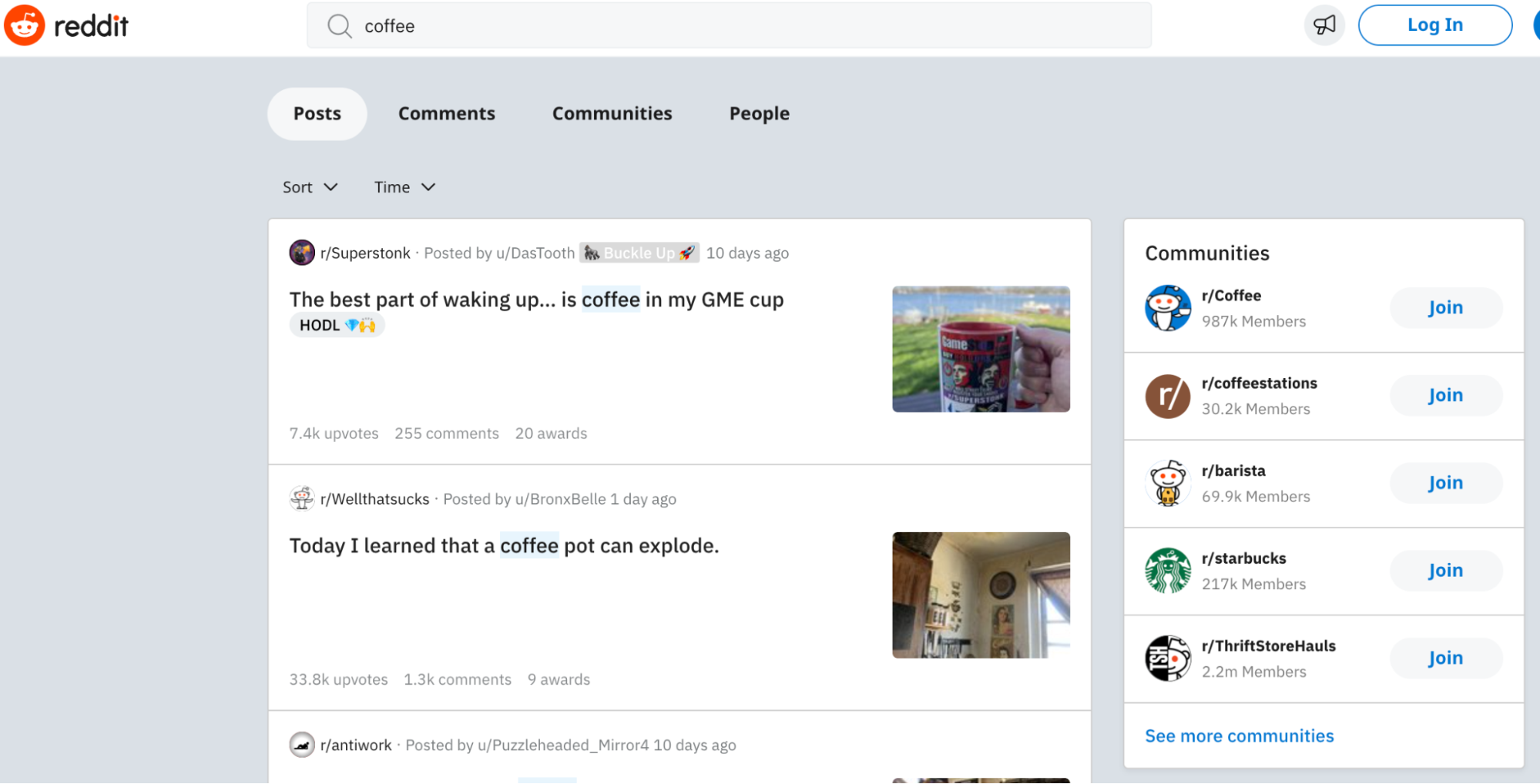
Look for top threads with many comments to find niche keyword ideas for your PPC campaigns.
18. Discover long-tail keywords with Quora
Long-tail keywords are precise and increase the likelihood of the search intent matching your offer, which could increase your click-through rate (CTR).
There’s also a better chance that your competitors haven’t discovered all the long-tails, which means you could get lower cost-per-click (CPC) for them than highly-competitive keywords.
Long-tails’ keyword difficulty (how hard it is to rank high) tends to be lower.
Long-tail keywords also have their imperfections—the search volume might be way too low to justify creating a SKAG with this keyword.
However, a quick look into Quora’s queries can give you ideas about your target audience’s problems and interests.
Just type in a keyword to Quora to see questions related to it.
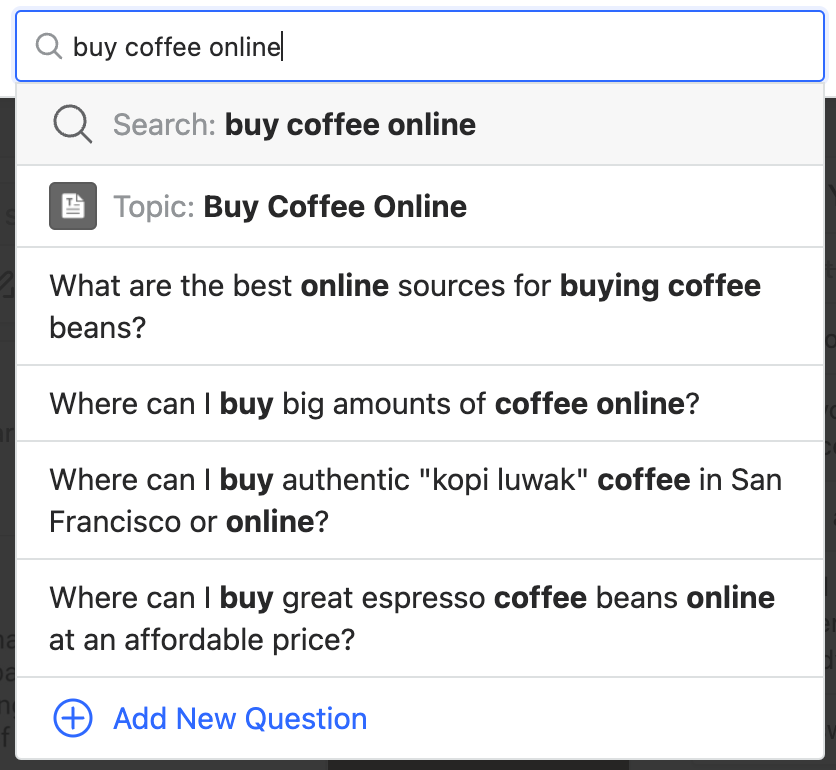
Browsing on Quora can give you tons of various insights:
- What are people talking about?
- What are the most popular questions with the highest number of answers?
- What solutions and products are most often suggested? (Maybe you’ll even find a new competitor to later spy on.)
- Which words are used to describe a product or service?
It’s important to keep in mind that no matter how cool a long-tail keyword might seem, its search intent must match with your landing page offer, and its volume must be large enough to be worth targeting.
19. Get smart insights with Wikipedia
We’re so used to Wikipedia that we look at it as a commodity rather than a powerful PPC tool.
But if you think about it, Wikipedia’s curated by thousands of industry experts and other highly-committed individuals.
Start by searching for a basic keyword. You’ll be taken to the Wikipedia entry for that broad topic.
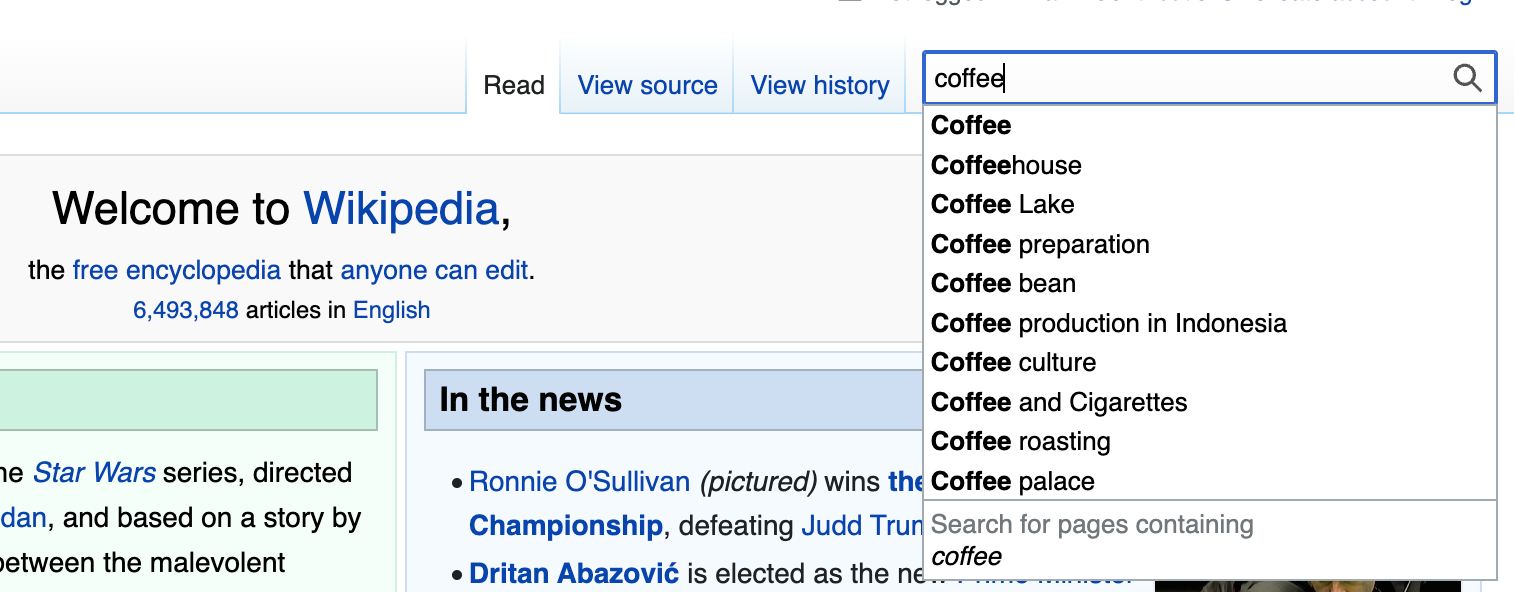
Have a look at the “Contents” section of the Wikipedia page. Some of these topics are amazing niche keywords that you may not have considered otherwise.
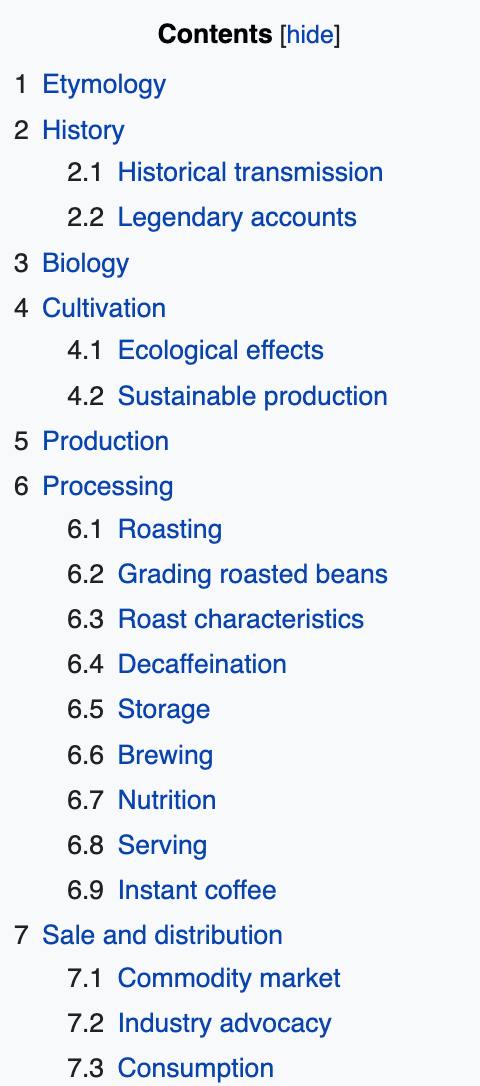
20. Spy on…your own salespeople
Sometimes using a keyword explorer won’t always be your best asset.
So put on your spy costume. Make sure that nobody’s looking. Wait until the sales manager leaves her table. Run for your life and steal her still-opened laptop.
Just kidding. That'll probably never work since nobody leaves their laptop unguarded these days.
Buuuut there is another way of getting your hands on sales call recordings and email exchanges: just ask the sales manager and explain why you need them.
So, why do you need all this sales history?
Reading and listening to the correspondences between your salespeople and customers will tell you many things about your target audience. You might learn
- why customers are interested in your product
- the expectations they have about your product or offering
- the words they use when describing various problems and solutions
It may turn out that what you thought were the most relevant keywords mean nothing to your clients. Maybe they have their own way of naming things, and you’ll want to find out about these words.
Another option is to get your hands on your company’s frequently asked questions. You can mine through the Q&A for more insights on popular topics, needs, and pain points from your customers’ perspective and turn those into keywords.
21. Play around with your existing keywords
Imagine you’re ordering a pizza with friends. You start by typing “pizza order near me,” but then someone adds, “Make sure they have anchovies.”
Before you know it, the “pizza order near me” search has turned into “pizza order near me with anchovies fast best.”
This happens all the time. People start by searching for a product or service and then continue to specify their search. They trust that Google will understand their question, even if it’s a grammatical Frankenstein.
If your ad groups mainly target exact match keywords, you might miss out on some of the nonstandard searches. Your exact match keywords will bring in some close variant searches, but they’ll be pretty close to your original keyword.
And using broad match keywords often leads to more irrelevant search terms than relevant ones.
Using phrase match keywords is currently the best way to ensure you’re capturing and showing ads to relevant variations of your keywords. Sometimes, though, even that’s not enough to net every relevant related search.
If you have lots of high-volume search terms, create versions of them as keywords with different word order or longer tails. Mix and match until you feel like you’ve covered all the possible variations.
22. Look for synonyms
The Second Edition of the 20-volume Oxford English Dictionary contains full entries for 171,476 words in current use.
Whichever PPC keywords you already have in your list, there’s a high chance that you’ve overlooked several synonyms.
An online thesaurus can help you turn a single “seed” keyword into 100 variations by presenting you with a synonym list.
Enter a broad keyword to the search and see what comes up.
In a tool like Power Thesaurus, you can narrow it down by filtering for nouns, verbs, single words, or phrases if there are too many irrelevant results.
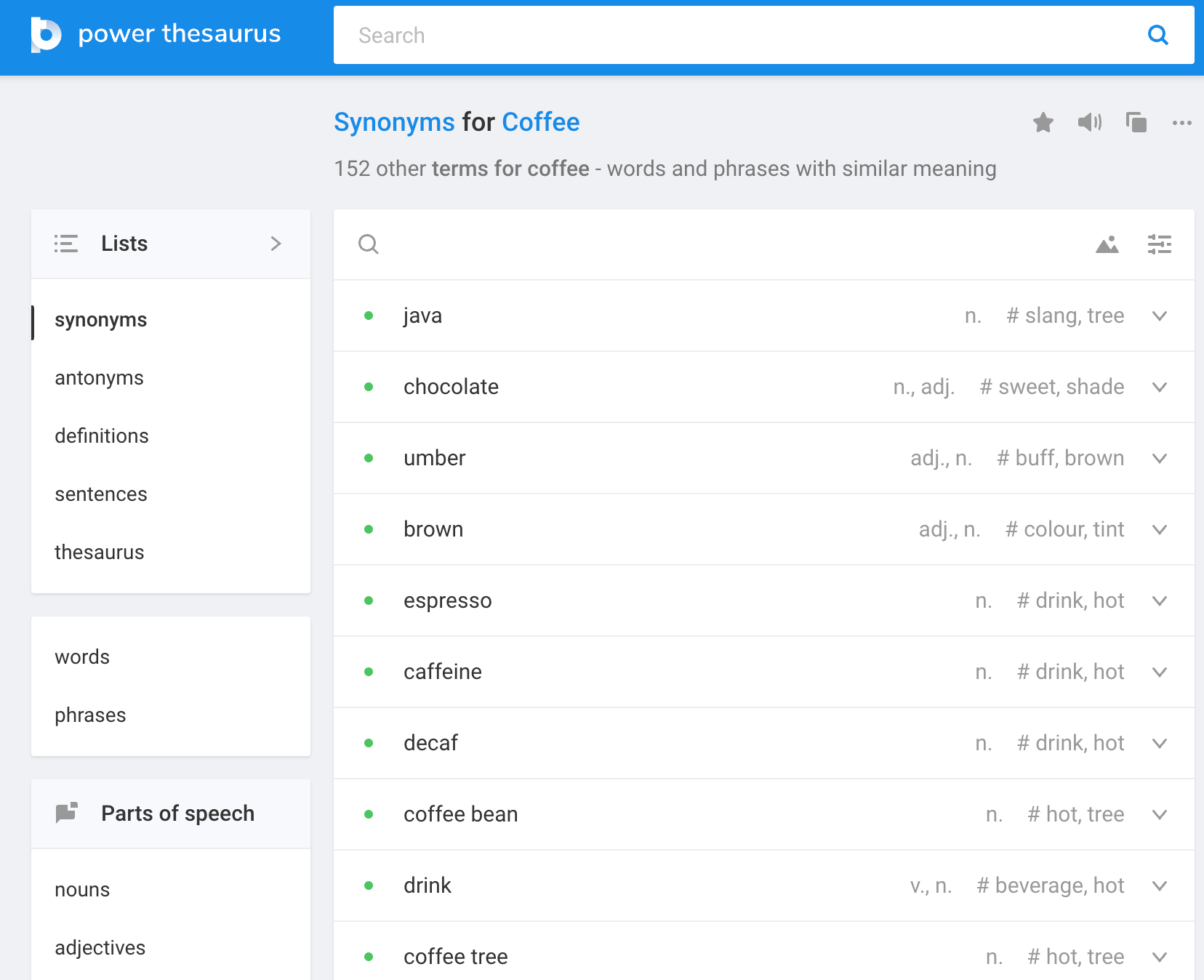
Take these keyword ideas and give them all a try
It’s a good sign if you’re exhausted from digging for PPC keyword ideas. It means that you put in a strong effort and came out of it with a shiny new keyword list to try out.
Ultimately, now you know the best places to draw keyword ideas from and how to keep digging even when it seems like you’ve found them all already.
Now, review your results like a skeptic and ask: “Would someone searching for this keyword combination potentially buy my product?”
Let go of the awesome keywords if the search intent doesn’t match with your product offer. You should still have plenty of great material for updating your PPC campaigns.
And since we’re on the topic of finding the right keywords to add to keyword lists, why not expand your knowledge even further with our article on negative keywords?
We’ll see you there.